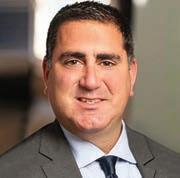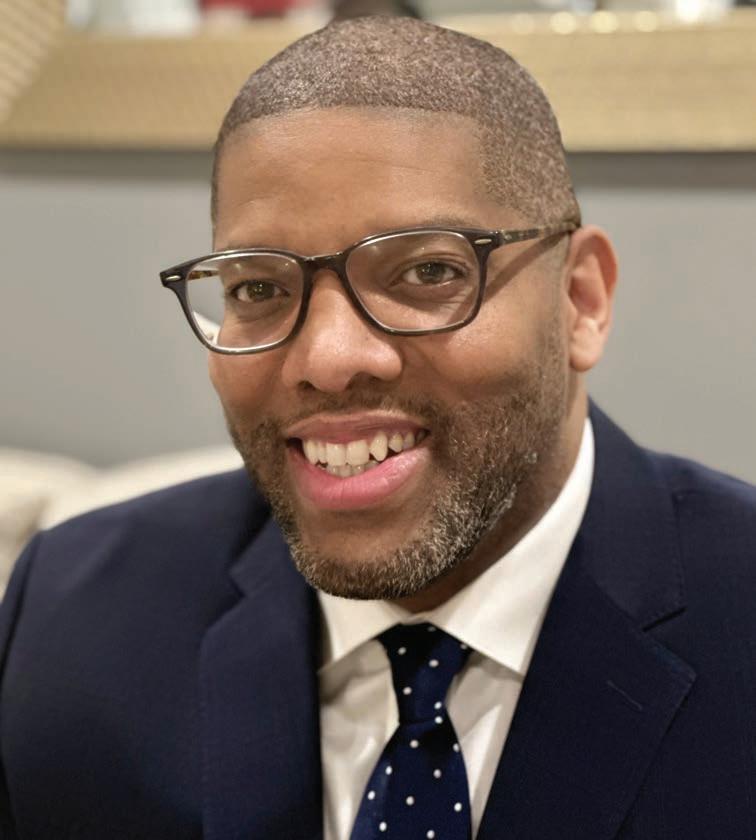






























Mayor Eric Adams isn’t known as one to skip a party. But he was conspicuously absent last month from Google’s ribbon-cutting for its new Hudson Square location.
e tech giant’s $2.1 billion o ce, known as St. John’s Terminal, is the most recent example of the sector’s investment in New York. e company in 2018 pledged to double the number of “Googlers” in New York in 10 years, and it met the goal in half the time.
e rm’s local sta now numbers 14,000.
Adams instead spent the day, Feb. 21, in St. Louis, touring a technology services company called WWT that holds the city’s largest minority- and womenowned business enterprise contract. Later in the day he accepted an award at a gala in support of jazz music, according to his public schedule. He didn’t send anyone else from City Hall to the Google event, either.
 BY THE NUMBERS $2.1B
BY THE NUMBERS $2.1B
The cost of Google’s new of ce at St. John’s Terminal
e choice struck some in the industry as questionable, especially for a mayor who has branded himself as a technophile and cheerleader for the industry. During his mayoral campaign, Adams promised to strive not just to modernize government by boldly experimenting with new technology, but to turbo-charge the industry itself by working closely with the largely West Coast-based giants who had set up shop in New York, assuring executives they would soon have an ally in City Hall.
At the start of his mayoralty, Adams took his paychecks in crypto and vied with Miami Mayor Francis Suarez over who could be more welcoming to the tech industry. But two years into his term, Adams’ relationship with the local industry has grown tenuous. A spate of regulations threatens the sector’s growth, the city all but shut down Airbnb, and Adams in recent weeks has taken aim at social media, comparing the platforms to cigarette companies. Leaders of some of the city’s biggest tech employers feel they have been misled by Adams about how open the city is to their input on rulemaking, according to



State lawmakers proposed raising taxes on high earners and enacting a version of the controversial tenant protection known as “good cause” eviction in their budget proposals released last week, staking out positions to the left of Gov. Kathy Hochul as the two sides begin negotiations on the
coming year’s state budget. e so-called one-house budget plans, released March 11 by the state Senate and March 12 by the state Assembly, include some overlaps with Hochul’s own $233 billion budget proposal for the 2025 scal year. e Senate’s proposal backs up Hochul’s calls to create a tax incentive for o ce-to-housing conversions in New York
City and lift a density cap on housing. It also expresses openness to a new tax incentive for a ordable housing construction akin to the lapsed 421-a program, whose replacement is a key priority for the real estate industry, as well as extending the old program’s deadline to cover projects already






See TECH on Page 24

State Senate Majority Leader Andrea StewartCousins released a one-house budget proposal that calls for a housing deal that would trade a new 421-a tax break for tenant protections such as “good cause” eviction. | NYS SENATE MEDIA

More than 1,000 small businesses have been awarded loans totaling more than $85 million through a city fund that was met with huge demand when it was announced last year, according to an announcement shared exclusively with Crain’s
Created in January 2023, the Small Business Opportunity Fund was aimed at giving a boost to enterprises that had struggled to receive pandemic aid or support from traditional banks. It was funded through a partnership between the city, the Mastercard Center for Inclusive Growth and Goldman Sachs, in what officials called the city’s largest ever public-private partnership directed at small businesses.
Now, the fund is wrapping up after giving low-interest loans between $2,000 and $250,000 to a total of 1,046 businesses. The num-
businesses might come in asking for smaller amounts,” Kim said in an interview. “But because of the pandemic, because of the businesses that were wanting to grow really fast, needing a little bit of extra capital, it reduced the number [of awardees].”
The loan fund initially contained $75 million but the city expanded it to $85 million thanks to additional help from Goldman Sachs, Kim said. The bank’s initial investment in the fund was $50 million.
More than 10,500 small businesses applied to the loan fund after it opened last year, prompting the city to stop taking new applications after just three weeks. Loans were given out on a rolling basis over the past year. (A total of 15,000 businesses expressed interest in applying.)
“The way it’s set up, it’s very favorable to small businesses and there isn’t a lot of funding out there like this.”
Sarina Prasabi, co-founder of Buunni Coffee
ber of awardees is smaller than the 1,500 winners that were initially projected because the average award value of $80,000 was more generous than officials had anticipated, said Kevin Kim, commissioner of the city’s Small Business Services Department.
“We had estimated that more

APRIL 17
POWER BREAKFAST
Mark your calendar to hear from Janno Lieber,
About 80% of the loans went to minorityand women-owned businesses — meeting a key policy goal of the Adams administration, which has had mixed success in boosting opportunities for MWBEs. Business owners used the loans to hire new staff, expand into new storefronts and refinance existing high-interest debt, according to SBS.
The loans came with a fixed interest rate of 4%, which is below the market rate. The city distributed the money by partnering with eight community development fi-

nancial institutions, which also contributed money to the fund.
Among the recipients was Sarina Prasabi, co-founder of Buunni Coffee, an Ethiopian roaster with four cafes in Upper Manhattan. Prasabi said her $100,000 loan, although less than the $250,000 she had sought, gave Buunni the financial security it needed to move forward on a longheld plan to open its own coffee roastery in the Bronx this spring.
“The way it’s set up, it’s very favorable to small businesses and there isn’t a lot of funding out there like this,” Prasabi said. “It gave us the confidence to secure the lease.”
Once open, the Bronx roasting plant will shorten the daily trip that Buunni employees are making from their existing roaster in Brooklyn. Buunni will also open up its roastery for use by other small coffee companies, Prasabi said.
Other recipients included the restaurateur Jae Lee, who used a $250,000 loan to expand his East Village Korean restaurant Nowon to a second location in Bushwick. The owner of Woodside’s Green Tara Market increased his supermarket’s inventory with a $100,000 loan, and the owner of Staten Island spa Chi Aesthetics added staff through her $100,000 loan.
“These loans, at the end of the day, are not just dollar signs but real investment in people and neighborhoods,” Kim said.
The loan fund was a one-time event and no program stands ready to immediately replace it, although city officials urge small businesses to use the online Funds Finder website that serves as a one-stop listing for city, state and federal grant and loan programs.
Kim said the city is in talks with other businesses that have expressed interest in funding similar small-business aid programs.
“We would love as many partners as possible to come in and do the 2.0 version of this,” he said.
The city’s plan to convert Midtown’s outdated industrial zones into housing would create some 4,000 homes and permit the densest kind of housing allowed in New York City, according to details released March 8.
Mayor Eric Adams’ administration first announced last summer that it wanted to rezone 42 Midtown blocks which for decades have allowed only industrial uses — an oddity in today’s city, where manufacturing has declined and housing is scarce. The plan focused on four collections of blocks between 23rd and 41st streets, bounded by Fifth and Eighth avenues — encompassing the Garment District and sections of Flatiron and Chelsea lined with loftstyle buildings.
That plan, which was only conceptual last year, is now fleshedout after months of public feedback. The so-called Midtown South Mixed-Use Plan could ultimately create about 3,975 apartments, of
which up to 1,110 would be income-restricted, the City Planning department said March 8.
Across all 42 blocks, the plan would continue to allow manufacturing but also permit the densest type of housing allowed anywhere in the city — R10 zoning, which now exists mostly on the Upper East and West sides. By mixing industrial, commercial and residential uses, the Adams administration aims to remake Midtown as a lively live-work neighborhood that policymakers see as crucial to the city’s pandemic recovery.
But the plan will depend on the appetites of local landlords, who must decide whether to convert their buildings. Several Midtown building owners told Crain’s last year that they supported the city’s plan but had no immediate desire to renovate their holdings into housing.
The feasibility of conversions will also hinge on whether the City Council passes the mayor’s City of Yes housing plan, which would allow office conversions in newer
buildings; and whether the state Legislature passes laws that would incentivize office conversions and lift a cap on residential density.
“This centrally-located, transitrich area should be one of the most exciting, vibrant areas of the city, but outdated zoning is holding it back,” City Planning Director Dan Garodnick said in a statement.
The Midtown South plan will be finalized sometime after April and start its seven-month public review later this year, which will culminate in a City Council vote. Unlike some land-use changes, this plan enjoys support from both local council members — Erik Bottcher and Keith Powers — meaning it appears likely to win approval.
City Planning says its final plan will also include design rules that will ensure any future developments “reflect the existing, beloved loft character of the neighborhood.” The rezoning area overlaps with the historic districts of Madison Square North and Ladies’ Mile, as well as individual
landmarks like the Tin Pan Alley buildings on West 28th Street and ornate old hotels like Gilsey House. (City officials said last year they were considering designating new landmarks as part of the rezoning process, like they did before rezoning Midtown East in 2017.)
City leaders have struggled in recent years to figure out what to do with Midtown’s remaining industrial zones. As recently as 2018, the city loosened the Garment District’s manufacturing-only zoning to allow for more office use, but city officials passed up a chance to permit housing. Local officials and business leaders wanted to allow apartments but faced resistance from then-Mayor Bill de Blasio’s administration, which wanted to prioritize creating affordable office space, according to people who worked on that effort.
That now strikes many as a missed opportunity, after the Covid-19 pandemic put to rest any notion that Midtown’s future could be commercial only.

The new owner of the Chelsea Piers entertainment complex inherited a venue that rests on 12,200 aged wooden piles that require millions of dollars’ worth of care every year to prevent the whole thing from sinking into the Hudson. But what really keeps it afloat is a bedrock clientele shelling out premium sums for space to play, work out or produce film and TV.
That’s all according to a little-noticed 2022 report prepared for the nonprofit that leases state land to Chelsea Piers, which was developed in 1995 by Roland Betts. In December, he sold the sports complex to Midtown-based real estate investment trust Vici Properties for $343 million, according to the firm’s annual report. As part of the transaction, Vici leased back Chelsea Piers to Betts for 32 years at an initial annual rent of $24 million, with a 10-year extension envisioned.
The deal means Vici, whose 127 million square-foot portfolio also includes the land underneath Caesars Palace and the Venetian in Las Vegas, now controls a nearly 800,000 square-foot complex filled with bowling alleys, batting cages, golf ranges, ice rinks, a fitness center, an indoor soccer field, film and TV studios and event space, plus docking spots for tour boats and yachts. Vici made the deal because more than
4 million visitors cross the busy West Side Highway each year to reach Chelsea Piers, more than the 3 million that go to the Metropolitan Museum of Art. What’s more, the complex commands pricing power on par with Knicks tickets. A bowling lane for two and a half hours on a recent weekend costs $328 for a family of four, shoes included. Private time on the ice costs $1,000 an hour, according to a 2022 report by an independent appraiser.
Over its 30-year existence Chelsea Piers has maintained “consistent margin profile,” Vici told investors in December, noting that 17 million golf balls are hit annually at the golf ranges.
“The recreational sports industry benefits from resilient demand as consumers, specifically parents, look to cut costs in other areas of spending before trimming back spending on their children,” the landlord wrote. “The core Chelsea Piers experience…cannot be digitized or disrupted.”
Piers, including $5 million from the marina, $4 million from the fitness club, $3 million from catering for birthday parties and other events, and $2 million from the golf club, according to the 2022 appraisal for the Hudson River Park Trust. The nonprofit leases the state-owned property on which Chelsea Piers rests to Vici in exchange for $9 million a year in rent, according to a spokeswoman.
“Chelsea Piers, as a ‘net’ lessee for an older waterfront property in a park setting, is obligated to perform a variety of extensive capital maintenance responsibilities and undertake public improvements that are not typical for inland tenants or tenants on private property.”
An adviser for Appraisers and Planners Inc. wrote
Vici, which didn’t respond to requests for comment, is the rare commercial REIT whose stock is worth more than in prepandemic times. It trades for about $30 a share. This month Moody’s raised Vici’s outlook to “positive” from stable, praising its 100% occupied portfolio and “resilient” cash flow.
won’t dissolve into the Hudson due to marine rot or damage caused by wooddevouring mollusks called shipworms.
Chelsea Piers will require at least $3 million annually in “continuing underwater capital repair,” the park trust’s adviser said.
“Chelsea Piers, as a ‘net’ lessee for an older waterfront property in a park setting, is obligated to perform a variety of extensive capital maintenance responsibilities and undertake public improvements that are not typical for inland tenants or tenants on private property,” wrote the adviser, Appraisers and Planners Inc.
So long as the tides remain calm, Chelsea Piers upkeep costs should remain manageable and its new owner can harvest cash from club memberships and birthday parties.
That experience produces several different streams of annual revenue for Chelsea
Chelsea Piers’ long-range fortunes will be closely tethered to the impact of climate change. Hurricane Sandy caused $15 million worth of damage. The complex’s operator has spent more than $80 million since 2010 shoring up the century-old piles underneath the massive structure so they
Chelsea Piers’ single most valuable asset is its 240,000 square feet of film and TV studio space on the premises. The space will produce $14 million in leasing revenue this year, the appraiser estimated, based on a comparable space at 333 Johnson Ave. in Williamsburg where Netflix pays an estimated $65 a square foot for 170,000 square feet of production space.
While Chelsea Piers studios are “inferior in utility” to the Brooklyn space, the appraiser said, “they are in a more desirable location in Manhattan where there is also a limited supply of film production space.”
The head of the city’s Sanitation Department, who has crusaded for neater sidewalks, is looking to sell her dapper uptown duplex.
heir to Loews hotel and energy fortune bought 79th Street apartment in 2011 for $8 million $13M
Jessica Tisch, an heir to the Loews hotel and energy fortune, is asking $13 million for the fourbedroom home at 9 E. 79th St., according to an ad that appeared this month.
Tisch and venture capitalist husband Dan Levine could make a tidy profit from a sale of the residence, which has a living room with a gas fireplace, a formal dining room and views of Central Park, plus a private laundry room in the building’s basement. Indeed, the couple paid $8 million for the apartment in 2011, when they bought it from Jessica’s parents, James and Merryl Tisch, public records show.
A member of one of New York’s wealthiest and most civic-minded clans — mother Merryl served for years as chancellor of the Board of Regents, which supervises the state’s vast public education system, and the family’s name adorns museums, colleges and hospitals — Tisch has spent her entire career in city government.
Hailed as a “get stuff done” leader when Mayor Eric Adams tapped her in April 2022 to be commissioner of the Department of Sanitation, Tisch has since overseen the adoption of a rule that businesses must place garbage in secure bins and not just leave it in heaped bags on sidewalks as has been done for decades.
The change, which kicked in on March 1 and is expected to affect 22 million pounds of trash from 200,000 businesses, may help Tisch fulfill her childhood dream to clean up the city, according to comments she made while being honored at last year’s Crain’s Women of Influence awards ceremony.
Under another major initiative on Tisch’s watch, homes and businesses can no longer drag their trash to the curb before 8 p.m. the night before a pick-up but instead must wait till later so the garbage is less obtrusive.
Also, the Sanitation Department is rolling out a climate-changebattling mandatory composting program that is supposed to reach its fifth and final borough, Manhattan, this fall, though the effort may prompt job losses at some community composting programs.

In 2008, after graduating from Harvard with joint law and business degrees, Tisch launched her governmental career under former Mayor Michael Bloomberg with a job involving data analysis for the Police Department. She later worked under Mayor Bill de Blasio, starting in 2019 as commissioner of the city’s Department of Information Technology and Telecommunications.
Loews, whose CEO is her father, James, meanwhile, is a conglomerate probably best known for its

high-end hotel line, but which also owns major stakes in natural gas companies, property insurers and plastic-packaging firms. Several family members serve on the company’s board.
Tisch’s duplex, which is just off Fifth Avenue and which also goes by the address 11 E. 79th St., is about as boutique as they come, with just seven homes across 14 stories. And the co-op’s rules may
also limit its reach: Purchases can’t be financed with mortgages but must be paid for in cash.
Deborah Grubman, the Corcoran Group agent listing the unit, did not respond to a request for comment.
The farewell performances of immersive theater production “Sleep No More” may be cut short thanks to a lawsuit from its landlord.
The suit, filed March 8 in Manhattan state Supreme Court, ac-
“This is nothing more than an administrative issue, and we are fully confident that the court will resolve this expeditiously.”
Arthur Karpati, “Sleep No More” producer
cuses “Sleep No More” of violating the city’s administrative code by not having a public assembly permit for its space at 530-542 W. 27th St., the site of the McKittrick Hotel near the High Line in Chelsea. Public assembly permits cover safety issues such as seating plans and fire prevention.
“Sleep No More’s” last temporary public assembly permit expired in January 2022, and its ongoing productions “can only be viewed as an attempt to maximize profits while blatantly disregarding the life, security and safety of the thousands of weekly guests” who attend, the lawsuit alleges. It puts on eight shows per week, and roughly 1,600 people attend them, according to the lawsuit.
The show tells the tale of William Shakespeare’s “Macbeth” but has guests decide what to see and where to go, giving each visitor a unique experience.
Landlord Centaur Properties is asking the court to issue an injunction stopping “Sleep No More” from using the property for its shows. The company wants permission to lock the entrance to prevent patrons from going in as well.
The lawsuit may just speed up “Sleep No More’s” closure if successful. The company had an-
nounced in November that it planned to close Jan. 28, with producer Jonathan Hochwald telling The New York Times it was due to rising production costs. However, the group has since pushed back its last performance to April 28 following “an outpouring of admiration as we bid a final farewell,” its website says.
Noah Levenson, the attorney for Centaur Properties, had no comment on the suit, while “Sleep No More” producer Arthur Karpati downplayed its claims.
“This is nothing more than an administrative issue, and we are fully confident that the court will resolve this expeditiously,” he said.
Centaur Properties bought 530542 W. 27th St. in 2007 for $29.4 million, property records show. The building used to be known for dance clubs like Spirit in the 1990s, when West Chelsea was a nightlife hotspot.
“Sleep No More” began leasing

space in December 2010 with the rent starting at $200,000 per month, court records show. Its latest lease is supposed to run through January 2032, with the rent currently at $438,000 per month and ultimately increasing to about $534,000 per month, according to court documents.
Centaur Properties is based on
Fifth Avenue in Midtown. It was founded in 1996 and focuses on properties in Manhattan’s SoHo, Tribeca, Chelsea, West Village and Flatiron neighborhoods. The firm’s website still touts that it “was instrumental in creating the home for the acclaimed theater show ‘Sleep No More.’”
C. J. Hughes contributed reporting.
Casino landlord and Chelsea Piers owner Vici Properties refinanced $1 billion in debt this month, a normally unremarkable transaction but one that a growing number of commercial landlords struggle to pull off nowadays.
On the same night of Vici’s debt refinancing, California-based Essex Property Trust did the same, borrowing $350 million unsecured at a 5.5% rate. Essex owns 62,000 apartments and benefits from continued strong demand for housing on the west coast.
“If you’ve got the right balance sheet, the market is accommodating.”
James Kammert, Evercore ISI analyst
Vici is a good bet because its two biggest tenants, paying 75% of the rent, are Caesars Palace and the MGM Grand on the Last Vegas strip. Not only is tourism exploding in Vegas, but the casinos’ annual rent hikes are linked to CPI data, Fitch Ratings said, so inflation doesn’t erode Vici’s rental income. Thanks to this customer base, Vici was able to borrow money that doesn’t come due for 30 years, a remarkably long time for debt that isn’t secured by property.
“If you’ve got the right balance sheet, the market is accommodating,” said James Kammert, an analyst at Evercore ISI.
The ability of these two real estate investment trusts to borrow shows markets are thawing after last year’s deep-freeze — if you’re the right kind of landlord. Conditions remain hostile for office buildings and the owners of some prominent Midtown towers are struggling to refinance loans made when interest rates were ultra-low and the supply of new tenants seemed unending.
The list of buildings facing debt-refinancing challenges include 280 Park Ave., whose $1.2 billion mortgage matures in September and has been transferred to special servicing, the financial world’s intensive-care ward. 731 Lexington Ave.’s $500 million mortgage comes due in June and Fitch recently lowered its outlook to “negative” in recognition a deal might not get done and kick off a
“prolonged” struggle. Commercial real estate investment fell in half last year to about $200 billion, the lowest sum since 2012, according to research firm Altus Group. But at the end of last year markets started to reopen as yields on the benchmark 10year bond used to set mortgage rates fell from a peak of 5% to about 4%. Landlords with stable cash flows are refinancing obligations at advantageous rates.
Thirty-year loans aren’t unusual in the residential mortgage market, because lenders can seize the property if a borrower defaults, but in commercial real estate they are much less common. Vici was able to borrow for 30 years without ponying up any collateral because investors believe tourists will continue spending vast sums in Las Vegas for a long time to come. The blended interest rate

on Vici’s new debt package is only slightly higher than the 5.625% rate of the previous deal that matured in 10 years.
Vici has bet $22 billion it has judged the market right, that’s how much it owes investors in long-term obligations. The firm is moving to distance its fortunes a bit from Las Vegas by acquiring
other “experiential” businesses, such as bowling alleys and, in December, Chelsea Piers. It was spun off seven years ago by Caesars Entertainment, the casino operator that emerged after a fierce bankruptcy battle told entertainingly by business journalist Sujeet Indap in The Caesars Palace Coup.

Imagine you’re living in Indiana right now. Or South Carolina.
Or Colorado. Choose any state, really, that’s nowhere near the TriState area.
You’ve got a middle-class job. Maybe you have a family. You’re living decently but modestly. You take, at most, one major vacation a year, and you decide that this year, this summer, you’re going to New York City. It’s been a while, with the pandemic and everything else, and you’re excited to see Times Square, the Statue of Liberty and the Empire State Building. You might like baseball, so you’ll ride the subway to a Yankees or Mets game.

But you turn on the news. You scroll through your phone. You start to see deeply disturbing headlines, like this one:
“Hochul sends 750 National Guard troops to NYC subways following spate of violence.”
You turn to your spouse: “Honey, I don’t think we’re going to New York this summer. It’s just not safe.” You pick a different trip, one that doesn’t seem to require the National Guard to
keep you safe. is hypothetical scene is bound to play out in homes across America this spring. New York lives and dies on tourism, and it was the plummeting of visitors during the pandemic that sent the city, temporarily at least, into an economic tailspin. New York, luckily, has recovered, but it hasn’t been easy — there are jobs tied to tourism and old commuting patterns in Manhattan that will never come back. Gov. Kathy Hochul, who sent 750 National Guard troops to the subway system this month to combat an uptick in crime there — a small uptick — does not quite understand what she’s doing. In a panic to stave o criticism from her right that Democrats are too soft on crime — a narrative that aided Republicans in the 2022 midterms — she has not only overreacted but done damage to New York’s very fragile image as a relatively safe American city.
New York is safe to travel through, live in and work in — not that you’d know it, listening to Hochul and Mayor Eric Adams.
e overall homicide rate declined last year; more people were killed in New York in 2023 than 2019, the last year before Covid, but there were actually more homicides in 2011 and 2012, which are imagined now as the halcyon Bloomberg years.
e recent attacks on subway conductors shouldn’t be handwaved away. But violent crime itself, on the system, remains rare. In 2022, a New York Times analysis found there was one violent crime for every one million subway rides, and the rate has only declined since. Even the NYPD has touted a recent month-long slide in subway crime; recent data show, merely, that transit crime rose 13 percent at the end of February, compared to the same time period in 2023. is, along with the Transport Workers Union’s demand for an inde nite military presence, is what prompted Hochul to deploy the National Guard troops to conduct random bag searches. e question is why the NYPD, with its large and heavily-armed force, is suddenly inadequate. Why can’t

normal police patrol the subway platforms when crime remains at a very manageable level? Genies don’t go back in bottles. New York, for its size, is safer than most American cities, and subway rides themselves, besides the unfortunate reality of the city’s large chronically homeless population, are rarely challenging. anks to Hochul, though, a new narrative
will harden, especially for those who don’t come to New York City often. ey will view New York as a war zone, not worth the trouble. Instead of promoting and celebrating the economic engine of the state she governs, Hochul will have hurt it. She can only hope the damage is temporary.
Ross Barkan is a journalist and author in New York City.
Gale Brewer shames landlord of illegal cannabis store for allegedly taking ‘illicit’ drug moneyBy Julianne Cuba
Upper West Side Councilwoman Gale Brewer is accusing the landlord of an illegal cannabis store in the neighborhood of taking dirty money instead of moving to evict his tenant following dozens of violations and attempts by the city to kick out the store.
“As the building owner, you are potentially liable for legal and nancial penalties for this conduct, including increased nes following the cannabis policy reform legislation enacted in 2023.”
Gale Brewer, Upper West Side councilwoman
On March 7 the former Manhattan borough president penned a missive to the landlord, Alan Sackman of the well-known development team Sackman Enterprises, expressing her disapproval for Sackman allegedly trying to cash in on the infamous store’s “illicit pro ts.” Sackman leases out the rst and basement oors of 550 Columbus Ave., between West 87th and West 86th streets, to Con-
venience on Columbus Corp., also known as Zaza Waza Smoke Shop. According to court documents, Sackman entered into a lease agreement with Convenience on Columbus Corp. in March 2022, renting out 420 square feet of space on the rst oor and an additional 400 square feet in the basement for $9,520 per month for the rst two years, rising to $9,800 per month this April.
But rather than complying with multiple levels of law enforcement, Brewer alleges, Sackman’s attorney — Allison Furman of her own eponymous Madison Avenue-based law rm — brought Sackman’s tenant to court Feb. 26, demanding at least $75,000 — plus attorneys’ fees — for breaching the lease by selling unregulated weed, cigarettes and banned e-cigarette products.
Furman led the lawsuit, which also seeks to force the tenant to acquire the proper license, on behalf of Sackman’s limited lia-
bility company, T&J 2006. e matter is next due in court April 4, according to court documents.

Although the Upper West Side is no stranger to illicit cannabis stores, or attempts to shut them down — Brewer estimates that there are about 70 in her district alone — she told Crain’s on March 8 that this is the rst time she has seen a landlord pull such a seemingly shady move.
Authorities have tried numerous times to shut down the smoke shop at 550 Columbus Ave., which sits just feet from Brewer’s local o ce, slapping it with dozens of violations for selling illegal products, all of the nes for which remain unpaid, according to Brewer’s o ce.
“You have been urged by me, the Manhattan District Attorney, and New York City Sheri to commence an eviction proceeding against Convenience on Columbus Corporation,” she wrote.
And her March 7 letter follows one she sent last month warning Sackman of the consequences of leasing his space to an unlicensed cannabis retailer, even o ering to

help with eviction proceedings. Commercial landlords are prohibited from knowingly leasing retail space to tenants that sell unlicensed cannabis, cigarette and tobacco products.
“As the building owner, you are potentially liable for legal andnancial penalties for this conduct, including increased nes following the cannabis policy reform legislation enacted in 2023, which included speci c provisions to address the proliferation of illegal shops,” she wrote Feb. 15.
Brewer told Crain’s she’s frustrated by the rollout of licensed cannabis stores. She currently only has illegal weed stores in her district, she said. But the local community board recently approved an application for one to open up on Broadway, she said.
‘We want to have the legal ones be successful,’ Brewer said.
Brewer says she has not received a response to her letter and doesn’t expect one. Attempts by Crain’s to reach Sackman and his attorneys were unsuccessful.
Mayor Eric Adams’ administration may redesign the 32-foot 5G transmitting towers whose installation across the city has sparked backlash in multiple neighborhoods for their sheer size, a City Hall official said March 8.
Since 2022, the city has installed more than 140 of the so-called Link5G towers as part of a publicprivate partnership that aims to expand speedy 5G internet and cellular service to more neighborhoods. The ultimate goal has been to install 2,000 poles across the five boroughs — but the rollout has been rocky, and was paused for months last year after federal officials ruled they needed to be subject to more environmental review.
cities that [have] done it, to see how we can make it different.”
Redesigning the towers would mark a major backtrack for the 5G program, which began as an effort to revamp the troubled partnership between the city and the private vendor CityBridge that runs the parent program LinkNYC. The program began in 2014 by replacing defunct phone booths with WiFiemitting kiosks; its leap into 5G was formalized in 2021, when Bill de Blasio’s administration persuaded the city’s Public Design Commission to sign off on the towers despite concerns over their size.
“We’re talking about 32-foot-tall features of the streetscape that are going to be there for many years, seen by tens of thousands of people each day. We should take the time to get the design right.”Erik Bottcher, city councilman
That pause has since been lifted, allowing construction on the towers to resume, city Chief Technology Officer Matthew Fraser said during a City Council hearing on March 8. But Fraser surprised lawmakers by adding that the Adams administration is “reassessing design elements” in response to public criticism.
“Some of the things that we’ve heard very recently, over the last year or so, is that many people aren’t fans of the look and the aesthetics of the tower,” Fraser said. “So we’re looking at other design options and elements from other
Those concerns have grown more audible since the first towers were installed in 2022. Business improvement districts have argued the towers might inconvenience pedestrians and said their flashy advertising screens could outshine adjacent businesses. And preservation groups on the Upper East Side and in Greenwich Village have criticized the “ungainly” towers while arguing they serve little purpose in alreadywell-connected Manhattan neighborhoods.
Fraser did not say when the new design would take effect, although he said the city might start a competition seeking proposals for the new transmitters’ design. The changes would need to be ratified again by the Public Design Commission.
Adams has mostly embraced the 5G program since taking office in 2022, and spoke at the unveiling of the first transmitting tower in the Bronx. The city’s contract with City-
Bridge requires 90% of the poles to be installed in the outer boroughs and above 96th Street in Manhattan — part of an effort to bridge the “digital divide” and benefit the estimated 1.5 million New Yorkers who lack both home and mobile broadband. (Still, the 5G poles, rather than improving people’s in-home internet connections, mainly benefit users at street level.)
In response to the neighborhood pushback, some business leaders have sought to shore up support for Link5G. Last year, the Partnership for New York City and dozens of other business groups sent a letter to the mayor and council speaker, imploring them to hold firm in their support for expanding what they called a critical technology for the city’s growth.
“When you’re judging how much you like or dislike the 30foot pole, make sure you understand that the future of our economy may depend on that 30-foot pole,” Kathryn Wylde, the Partnership’s CEO, told Crain’s in June. She argued that most criticism of the towers boiled down to typical “NIMBY” objections from wealthy neighbors.
Fraser revealed the potential changes while being questioned during a council technology committee hearing by City Councilman Erik Bottcher, who represents Manhattan’s West Side. Bottcher told Crain’s afterwards that he was pleased by the news.
“We’re talking about 32-foot-tall features of the streetscape that are going to be there for many years, seen by tens of thousands of people each day,” Bottcher said. “We should take the time to get the design right.”
Although lawmakers seemed to interpret Fraser’s comments as a
The Adams administration is partnering with a major construction union and a Midtown-based real estate investment firm to launch a more than $400 million fund supporting affordable housing in the city.
Mayor Eric Adams has joined with the Building and Construction Trades Council, run by President Gary LaBarbera, and Cirrus Real Estate Partners on the initiative, his administration announced March 8. The trades council and Cirrus have initially pledged an investment of more than $100 million, with the trades council money coming from 11 union pension funds. Cirrus expects to raise more than $400 million for the initiative overall.
The funds are specifically meant to help build housing that would be affordable to trades council members, who typically work as plumbers, fireproofers or in other areas of construction.
Projects the fund invests in should be for New Yorkers earning between 80% and 140% of the area median income, meaning a family of three would have to earn between $101,680 and $177,940 per year to spend no more than about one-third of their income on rent. The projects should also be close to transit, environmentally friendly and built with union labor.
Opportunities to support such affordable housing include part-

commitment to change, the city’s Office of Technology and Innovation, which oversees Link5G, said nothing has been decided. Ray Legendre, a spokesman for OTI, said in a statement that “CTO Fraser is interested in looking at every option for enabling existing street furniture to support Wi-Fi and other services, similar to the Link5G program.”
CityBridge, which operates the Link program, is a joint venture made up of tech companies Intersection and Boldyn Networks — although the group’s membership has changed multiple times since its inception. A few years after LinkNYC’s 2014 launch, CityBridge owed the city nearly $60 million in revenue-sharing payments from advertising, had fallen behind on its installation targets and had put most of its kiosks in wealthy neighborhoods in Manhattan and Brooklyn despite its stated goal of improving connec-
tivity in low-income areas.
City officials amended their contract with CityBridge in 2021, aiming to revamp the program by allowing for 5G towers and slimming the revenue-sharing payments that CityBridge had struggled to pay. Instead of relying solely on advertising revenues, the 5G program allows CityBridge to collect fees from the cellular carriers whose equipment is housed in each tower.
Although installations have resumed since last year’s pause, the ruling by the Federal Communications Commission has had consequences: Patch reported that nearly all of the 18 5G towers once planned for the Upper East Side have been canceled after a historic preservation review. Carnegie Hill Neighbors, an East Side group opposed to the towers, praised Fraser’s announcement on March 11 and called for “more review” of the program.
nering with the city’s Department of Housing Preservation and Development on mixed-income projects and building projects on city-owned land. This is the latest effort from Adams to boost housing production in the city and meet his moonshot goal, announced in December 2021, of building 500,000 new homes over the next decade. His administration also hopes to get its City of Yes housing plan through the City Council this year. It aims to increase New York’s housing supply through measures including eliminating parking requirements and permitting dense neighborhoods to have taller towers.
The administration has been pushing for more action on housing from Albany as well, namely

coming up with a replacement for the expired 421-a affordable housing tax break. Gov. Kathy Hochul’s latest effort to replace the program includes having the Building and Construction Trades Council and the Real Estate Board of New York reach a deal on labor standards for eligible projects. The two sides recently agreed on a minimum wage of $40 per hour for construction workers starting
in 2026. This marks significant progress, although there are still several hurdles to overcome. Cirrus has offices in New York and Florida, and the firm lists on its website a $105 million loan for a Manhattan office building and a $46 million loan for a Manhattan condo building as two of its recent transactions, although it does not specify the addresses for these projects.

As city Comptroller Brad Lander calls on New York to bump up its investment in a ordable housing for poor and working-class residents, he shouldn’t escape criticism for how little the city’s ve pension funds, which he oversees, have contributed to the cause.
Lander is the investment adviser and custodian of the nearly $264 billion in retirement assets for teachers, re ghters and other such public employees. As recently reported, pensions have distributed 1% of their assets to the creation of a ordable and worker housing in the two years since Lander began shepherding them, according to city records. at’s down from the 1.4% distributed in 2018 and is under the 2% that pensions can put into economically targeted investments.
While running for his seat, Lander promised to “reinvigorate” the investment program in order to put more money toward the creation of a ordable housing. And his o ce says the investments haven’t grown because many are longer-term, xed-income assets that shed value when mortgage rates jumped starting in 2022.

Lander recently stood with members of the City Council’s progressive caucus to call on the city to put an additional $2 billion through four years toward “permanently a ordable housing,” including preserving thousands of rent-stabilized units.

ese funds, however, would come from municipal borrowing and not the city’s pension funds.
e city’s pension funds have invested

only about $4.5 billion in the economically targeted investments program in its over 40 years of existence. And even though “We need more a ordable housing!” is a popular rallying cry these days, the comptroller should make sure his own backyard is clean before he criticizes someone else’s.
Days before Lander and the progressive caucus issued their call, Mayor Eric Adams’ administration announced that it is
Every resident of New York City has experienced the e ects of climate change, however, some of our communities and neighborhoods are bearing its brunt more than others. ese communities are often low-income or marginalized. at’s why it’s so important that the New Yorkers who are most vulnerable to climate change are also the future of New York’s clean energy workforce. ey are, after all, at the center of the crisis.

e disproportionate impact of climate change is clear. Low-income residents make up half of the 1.3 million people who live in ood zones across New York City. In the coming years, climate change is likely to drive stronger and more frequent storms in the New York City region, bringing heavier rainfall and coastal storm surge. Extreme heat waves will increase in both frequency and intensity.
It’s not just the e ects of climate change that are unequal. e clean energy industry has made progress towards addressing these inequities, but more can still be
done. According to a 2021 national study, Black Americans represent 8% of the clean energy workforce, while Latinos make up 17%. Women have also been underrepresented in the clean energy space, making up only 27% of employees in the energy sector.

New York has been leading the charge to remedy this underrepresentation. We recognize the importance of having a diverse workforce, and Con Edison re ects that commitment: 51.7% of its employees are people of color. Diversity strengthens our workforce and our communities, access to clean energy careers should be available to all New Yorkers.
e electri cation of heating and transportation, energy storage, and renewable generation needs to happen quickly.
Meeting New York’s climate goals will require more than a collective e ort, it requires strategic partnerships.
That is why Con Edison and LaGuardia Community College are joining forces to change this trajectory and make clean energy jobs accessible. Con
partnering with the Building and Construction Trades Council and Midtownbased Cirrus Real Estate Partners to launch a more than $400 million fund supporting a ordable housing in the city. As senior reporter Eddie Small noted, the funding is meant to help build housing that would be a ordable to trades council members, who typically work as plumbers, reproofers or in other areas of construction. is is the mayor’s latest e ort to boost housing production in the city and meet his goal, announced in December 2021, of building 500,000 new homes over the next decade.
Calling for more a ordable housing is always a good thing. is is a topic that should stay top of mind for city and state o cials until the abysmal 1.4% vacancy rate for rentals, the lowest it has been since 1968, is recti ed. But there is a big di erence between talking and taking action.
If the city’s pension funds are authorized to invest in a ordable housing, then they should. And the city comptroller must see to it that they do. Anything else is just words.

Edison is committing more than $1 million to help LaGuardia Community College, in partnership with Urban Upbound and Building Skills New York, accelerate its recruitment efforts for the LaGuardia Clean Energy Academy. The academy trains New Yorkers from lowincome communities of color — including public housing residents from the Queensbridge, Ravenswood, and Astoria Houses — to become solar installation technicians and electrical helpers. The program allows New Yorkers to support our state’s clean energy efforts while simultaneously opening their doors to a career that creates economic mobility.
Con Edison’s partnership with LaGuardia is part of an overall e ort to provide $4 million to four New York City nonpro ts to support their e orts in connecting more than 1,200 New Yorkers with job training opportunities in the clean energy and
technology eld. is partnership is an example of Con Edison’s focus on investing in nonpro ts and community partners who share a commitment to combat the e ects of climate change, advance social justice in communities, and create green jobs across the New York metro area.
ose most impacted by climate change should be the New Yorkers ensuring that our transition goals become a reality. And by connecting them with careers in renewable energy, we’re creating opportunities to directly transform the future of their communities as well. It’s not just about harnessing clean energy; it’s about empowering New Yorkers.
We live in an age of scientific miracles. We have an unprecedented ability to identify the causes of disease, and we have access to treatments, and even cures, we could not imagine only a few decades ago. Through exome or whole genome testing, we have the ability to personalize treatments for patients to deliver more effective care to people suffering from a wide range of diseases. Nowhere is this progress more critical than in the case of those battling rare or ultra-rare genetic diseases, defined by federal law as diseases that affect less than 200,000 people in the United States.

But herein lies the problem: The research and development of medications to treat these rare conditions come with a significant price tag. This poses a unique challenge for both commercial insurance companies and public health care systems like Medicare and Medicaid) as it’s harder to make the case for cost-effectiveness when you’re dealing with a smaller patient population. However, one thing is undeniably clear: These life-saving medications should be accessible to patients, especially when access to them can be the difference between life and death.
Consider Bardet-Biedl Syndrome, a harrowing condition that leaves patients per-
petually hungry, leading to morbid obesity and a host of other health issues. I recently spoke to a parent whose child battles BBS, who recounted the long-term physical and psychological impact the condition has had on her child. Imagine being repeatedly told by doctors that your child’s weight issues stem from poor choices, when in fact this relentless hunger is beyond your control. This mother recounted her family’s arduous journey to find an endocrinologist who ordered genetic testing revealing the presence of BBS and identified a drug to treat it. Yet Medicaid does not cover the medication, equating it to any other obesity drug. Thankfully, the child is now in treatment, but only because of the manufacturer’s commitment to patients.
Policymakers across the country are becoming increasingly aware of the unique challenges of rare diseases and the treatments they demand. Many states have set up rare disease advisory councils composed of experts who advise policymakers on rare diseaserelated matters. On the federal level, there’s a Rare Disease Caucus in Congress. Similar efforts are sprouting at the state level, where lawmakers with a deep passion for life sciences and rare diseases space are forming similar Rare Disease Caucuses.
Unfortunately, the effort in New York has been more muted. Currently, there is a Rare Disease Workgroup in New York, but it was established only after significant compromise that watered down the legislation originally passed by the Legislature. That workgroup is charged with producing a single report, originally due in December 2021 but still pending as of this writing. Fortunately, Gov. Kathy Hochul announced a renewed focus on rare disease in her 2024 State of the State address, including a desire to make the Rare Disease Advisory Council permanent.
Make no mistake, it is commendable that the state is taking steps to better understand how it can help those suffering from rare diseases. New York contains a plethora of world-class research institutions and has the capacity to be a world leader in life sciences technology on par with California and Massachusetts. New York also has a well-deserved reputation as a state that cares about the health and well-being of its residents, with generous public programs like Medicaid focused on ensuring that all New Yorkers get the care they need. We also have some passionate legislators and administrators who work hard to make sure those programs continue to work the way they should. However, we frequently fall short when it comes to
It’s hard to believe in this age of hyperconnectivity, but about half a million people living in New York City and its suburbs still lack access to high-speed broadband despite more than a decade of state and federal programs that have poured billions of dollars into closing the digital divide.
It’s a jarring reminder that lack of online access isn’t just a rural issue, but one that strikes nearly at the center of a global hub synonymous with all things modern and hightech.

All told, roughly half of the state’s 1 million households who lack access or a subscription to home broadband services are on Long Island, the Mid-Hudson Valley and New York City, according to a 2021 report from state Comptroller Thomas DiNapoli’s office.
So why the chronic gaps in coverage? It’s not just the lack of funding. Red tape is a big culprit, including an onerous and needlessly complex permitting process for new projects.

Michael N. Romita is the president & CEO of the Westchester County Association, and Matt Cohen is the president & CEO of the Long Island Association.
That’s why lawmakers in Albany must pass legislation that simplifies these bureaucratic hurdles and streamlines permitting for broadband and wireless telecommunication applications. For years, state legislation addressing these concerns has failed to make it out of committee and, as a result, our communities pay the price.

Research and development of medications to treat these rare conditions come with a significant price tag, writes health care lawyer and lobbyist Mark Ustin.
rare diseases.
The state Legislature has declared Feb. 29, 2024, as Rare Disease Day in New York, making this a perfect time to take the steps necessary to realize these goals. The governor is right to seek the establishment of a permanent Rare Disease Advisory Council. The Legislature can also establish a Rare Disease Caucus to leverage the interest and experience of knowledgeable legislators, many of whom are already fervent advocates for rare disease sufferers. More broadly, the state can invest more in life sciences research, and provide coverage for genetic testing and rare disease treatments that can vastly improve the lives of countless New Yorkers. Researchers, clinicians, and, most crucially, patients and their families deserve nothing less.
Right in the heart of our supposedly advanced communities are kids who can’t do their homework, businesses that can’t maintain a competitive edge, employees who can’t work from home, and — perhaps most concerning — people in trouble who can’t call for help.
Reforming this process is consistently highlighted by industry stakeholders and community leaders as a key priority. The need for quick action was underscored yet again in a recent report from Hudson Valley Pattern for Progress, which reviews the bureaucratic roadblocks preventing the investments necessary to bring next-generation wireless technology to many suburban communities. New York should look to California, which has eliminated barriers to universal
connectivity by enacting legislation to streamline its broadband permitting process through “batching” applications. Now in the Golden State, as many as fifty permit applications for “substantially similar” broadband project sites can be processed by state regulators under a single permit.
In New York, meanwhile, the current permitting system remains byzantine and time-consuming, and it varies from one community to the next, which discourages critical infrastructure investment. As a result, providers hesitate to commit the time and resources in complex planning for individual municipality deployment projects, fearing their applications will be left pending while costs steadily increase.
It goes without saying that high-speed, reliable broadband connectivity is essential for driving economic growth, enhancing quality of life, and fostering digital equity for all New Yorkers. It is also a matter of public safety. Tragic incidents by those unable to make emergency calls due to connectivity have occurred statewide.
The precise solutions to process issues should be unique to each state, and we do not advocate for stripping municipalities of their decision-making role in the permitting process. But simplifying and stan-

dardizing the permitting process while respecting municipalities’ decision-making authority is not only possible, but necessary.
Enacting reforms that cut red tape and provide clearer, more consistent guidelines for broadband and wireless infrastructure deployment will expedite the expansion of reliable internet access to underserved areas, benefiting individuals, businesses, public safety and overall quality of life.
Particularly now, as the state’s ConnectAll initiative prepares to invest close to a billion dollars to improve digital access and bridge the digital divide, we need lawmakers in Albany to take decisive action and pave the way for a more connected and prosperous future.
Reliable cellular service and high-speed internet is essential — especially in the post-COVID landscape where so much of our work, education, and health care and more is now online. Together, we can bridge the digital divide to ensure that everyone can thrive and not get stuck in the slow lane of the digital highway.
Ranked by
5
6
16
NewYorkarea includesNewYorkCityandNassau,SuffolkandWestchestercountiesinNewYork,andBergen,Essex,HudsonandUnioncountiesinNewJersey.Toqualifyforthislist,organizations mustbetax-exempt501(c)(3)healthcarenonprofitsheadquarteredintheNewYorkarea.Hospitals,healthsystems,homehealthcare,rehabilitationcenters,medicalpracticegroups,researchinstitutions anduniversitiesareexcluded.Datafromsomeorganizationsincludesworkinareasunrelatedtohealthcare.Informationisfromthecompaniesunlessotherwisenoted. 1. Figuresfromorganization's Form 990. 2. Figures are from audited financial statements. 3. Includes data from 990s for two affiliated organizations.



New York state legislators are rejecting the governor’s plan to control Medicaid expenses by overhauling a $6 billion home care program, signaling a divide between the governor and the legislatures on long-term care spending.
Gov. Kathy Hochul’s executive budget proposed to cut costs related to the Consumer-Directed Personal Assistance Program, a Medicaid-funded home care program that allows New Yorkers to hire their own home care aides. The program enables older adults and people with disabilities to choose a family member or friend to provide personal care assistance — and get paid by the state through nonprofits or businesses that manage payroll.
Supporters of the consumerdirected program say it’s a critical service that provides people with the freedom to manage their own care. But the state has become skeptical of the program’s high costs and lack of transparency. Officials say that state spending associated with the program has risen $1,200% in the last decade — contributing to an inflated Medicaid budget that is expected to reach $31 billion in the upcom-
ing fiscal year.
More than 250,000 New Yorkers receive care through the consumer-directed program, according to health officials.
The New York state Senate and Assembly omitted all of the governor’s proposed changes to the program from their one-house budget proposals, which were released last week.
The changes include a plan to reduce wages for personal care aides, as well as several measures to overhaul the structure of the CDPA program. The governor proposed to change the way the state contracts with nonprofits and businesses that manage payroll for personal care aides and limit how many hours aides can work.
The one-house budget proposals also rejected one of the governor’s more controversial plans to ban people who receive consumerdirected care from appointing “designated representatives,” which are third-party entities such as spouses or parents that manage care for people with conditions that prevent them from doing so on their own. Home care advocates said the elimination would exclude children,
people with intellectual disabilities and those with Alzheimer’s or other memory conditions from participating in the program entirely.
The Hochul administration estimated that changes to the consumer-directed program would save the state at least $300 million in the upcoming fiscal year if they go into effect in October. Advocates say that if the changes were passed, they would result in a $1.2 billion cut to state and federal spending on home care once they were implemented for a full fiscal year.
The state says its proposed changes are an attempt to not only improve transparency for the consumer-directed program, but also restore it to its original intent — to allow New Yorkers with complex medical needs to receive personal assistance at home and self-direct their care. But advocates say that the proposed changes would reduce access to care as New York faces a shortage of home care workers.
The legislature’s rejections of changes to the CDPA program come as recent polls show New Yorkers’ support for the consumer-directed program. More than 70% of New York voters opposed wage cuts and limitations on worker hours included proposed by the governor, according to a survey backed by

labor giant 1199 SEIU released this month. The poll, conducted by Hart Research, surveyed more than 800 registered voters.
Despite the legislature’s opposition to the governor’s home care cuts, lawmakers did not adopt a proposal that advocates say is a solution to long-term care spending. The Home Care Savings & Reinvestment Act, which
would shift home care services from Medicaid managed care to a state-operated fee-for-service program, was not included in the one-house budget proposals. The Senate signaled that it would be willing to discuss solutions to make long-term care more efficient — including within the current managed long-term care system.
The governor and the state legislatures plan to adopt a final budget by April 1.
Looming closure of Mount Sinai Beth Israel hospital was ‘responsible’ for the death of a patient, lawsuit allegesBy Jacqueline Neber
The looming closure of Mount Sinai Beth Israel has led to a man’s death, a new legal filing in a case against the health system alleges.
taken to Mount Sinai Morningside.”
After arriving at Morningside, seven miles away, Kathleen Faust alleges that her husband spent nearly two days in the emergency room on a cot because the hospital did not have enough staff to move him into an inpatient room. He was later admitted and then released on Jan. 22 after being prescribed medication for pain, according to the documents. Faust claims he received little actual treatment and Mount Sinai did not understand the extent of her husband’s injuries, follow-up or arrange for in-home nursing care.
“It is my belief that my husband’s two weeks of suffering and his death would not have happened had Beth Israel Hospital been in full service.”
Kathleen Faust, widow of George Faust
In an affidavit filed March 13, Greenwich Village resident Kathleen Faust alleges that her husband, George Faust, died because of short staffing and lack of treatment he received at Mount Sinai hospitals. He fell while alone at home on Jan. 15 and suffered broken ribs and a collapsed lung, according to the filing. On Jan. 16, an ambulance took him to Beth Israel, the legal filing alleges, where he was taken into the emergency room, had X-rays and was given a procedure to inflate his lung.
“The staff informed my husband that Beth Israel did not have sufficient staff to handle a ‘trauma patient,’” Faust wrote. “He was placed back into an ambulance and was
As a result, George Faust was then taken to New York City Health + Hospitals/Bellevue on Feb. 2 with “unbearable” abdominal pain, according to the court filing. Doctors there found that blood had accumulated in his lungs and abdomen, the filing said. He died on Feb. 4 at the hospital.
“It is my belief that my husband’s two weeks of suffering and his death would not have happened had Beth Israel Hospital
been in full service,” Faust wrote. “What happened to my husband should not happen to anyone. This Court can do something to avoid this in the future.”
While he declined to comment on the pending litigation, Mount Sinai representative Loren Riegelhaupt said Mount Sinai has “deep sympathy” for Faust’s family. But, he emphasized, Beth Israel is not and has never been a certified trauma center.

“A patient with traumatic injuries like the one in question should always be transferred to a certified trauma center, no matter where the patient entered the system. This tragic event is completely unrelated to the planned closure of MSBI,” he told Crain’s. Mount Sinai Morningside operates a Level 2 trauma center.
Faust’s filing is the latest claim filed in a February lawsuit against the health system and the state department of health which alleges that Mount Sinai has been deliberately cutting staff and services to expedite the closure of the East Village hospital. In more docu-
ments filed March 13, attorney for the plaintiffs Arthur Schwartz argued that the health system has been understaffing hospitals across its network, as evidenced by recent penalties Mount Sinai has faced for short nurse staffing in several units at multiple hospitals. The consequences of the understaffing have and will ripple across the system, Schwartz said. Patients will suffer “irreparable injury” unless the court orders Mount Sinai to restore services it has cut, Schwartz argued, representing the Community Coalition to Save Beth Israel Hospital.
Mount Sinai’s plan to close the hospital because of insurmountable financial losses has sparked intense legal and community backlash. Community groups have raised concerns about how the shutdown would impact vulnerable and elderly patients who would have to travel further to access an emergency room and critical care services, while Mount Sinai has maintained that it is not abandoning the downtown community.
Mount Sinai plans to close Beth Israel on July 12 and has not yet filed its reply papers in court.
The New York Stock Exchange is among the largest marketplaces in the world for securities and other investments, with an equity market capitalization above $25 trillion in 2023. The exchange has its roots in a 1792 meeting of two dozen stockbrokers under a buttonwood tree on present-day Wall Street and was officially constituted as the New York Stock and Exchange Board in 1817.
Legions of financial heavyweights have emerged from New York, a selection of whom we celebrate here. This collection of Notable Leaders in Finance features individuals originating deals, leading impact investing, managing generational wealth, broadening access to capital and more.
Methodology: The honorees featured here were nominated by their peers, companies or other acquaintances. Crain’s New York Business editors selected nominated honorees based on their accomplishments, track record of success and contributions to their industry and community, as outlined in the eligibility section of the nomination form.
Read on to learn how these honorees are shaping these important industries.

David Acharya is a managing partner at Acharya Capital Partners, where he oversees the firm’s investing, management and strategic activities. He boasts more than 25 years of investment and transaction experience, having previously worked with private equity firms such as AGI Partners and Apprise Media. In his current role, he raises investment capital and develops relationships with investor and banking communities. Acharya has advised, structured and raised more than $18 billion of capital for worldwide telecommunications, media and consumer product companies. He is former chairman and president of the New York chapter of the Association for Corporate Growth and is a frequent speaker on topics such as private equity, value creation, family offices and the independent sponsor model.

At TD Bank, Andrew Bregenzer has been regional president for the metro New York region since 2016. He supervises retail distribution and all facets of commercial lending for the region, which consists of more than 320 stores and numerous commercial lending teams across New York City, upstate New York, northern New Jersey and elsewhere. Bregenzer, who boasts more than three decades of banking experience, has worked to achieve TD Bank’s goal of claiming market share throughout the state, creating and implementing strategies to build out TD Bank’s store distribution network. Outside of work, he serves on the board of directors for the New York City chapter of the American Cancer Society.

Jonathan Aghravi serves as principal at JBA Equities, a boutique capital advisory firm. He is responsible for originating and executing JBA’s deal flow, establishing relationships with various developers and real estate owners, and focusing on business development. The firm caters to a substantial list of clients, financing more than 150 commercial real estate loans with a total capitalization of over $2 billion in debt and equity since its 2019 inception. Despite a volatile financing environment, Aghravi has still secured impressive financing solutions, with recent deals ranging from small multifamily loans of $10 million to hotel bridge and mezzanine financing up to $135 million. He also finds time to mentor young professionals and is an active member of multiple industry organizations.

As chief investment officer at the nonprofit Phipps Houses, David Chao oversees the organization’s reserve fund, i.e., monies invested in public and private markets. The funds are used to acquire land and properties that help to fulfill the organization’s mission of providing affordable housing and social programming. Chao was especially instrumental at the height of the pandemic, when Phipps Houses worked to move forward with its mission despite great uncertainty: The funds he invested outperformed many market indices. Chao served as a member of the Edgemont Union Free School District Board of Education for more than a dozen years. In addition, he has served as a member of the board of the Institute of Applied Human Dynamics.

James Ahern serves as a managing partner at the investment bank Laidlaw and Company, as well as founder of Laidlaw Venture Partners. Ahern, who joined Laidlaw in 2010, is credited with establishing a recognized health care brand: Laidlaw Capital Markets is known as a health care investment bank providing targeted outreach to relevant health care-centric investors. During his tenure, Ahern led or played an integral role in providing clients with more than $12 billion; his primary responsibilities at the firm are centered around its venture capital investments. Ahern currently serves on the board of directors of Algorithm Sciences, Aerwave Medical Technologies, Voltron Therapeutics and PD Theranostics. In addition, he is a member of the board of the New York City Renaissance.

Dan Chung
Chief executive officer and chief investment officer, Alger
Dan Chung is chief executive officer and chief investment officer of Alger, a firm that manages $22 billion in assets and employs more than 170 people across the U.S., Europe and Asia. Chung, who has been at Alger for 30 years — including 22 as its leader — has led growth in several of the firm’s flagship funds. He has also helped Alger support various New York City-based causes, including efforts to pay off student loans for nurse managers in the Covid ward of Brooklyn Hospital during the pandemic. Chung also created the Candlelight Giving Program, Alger’s employee-led philanthropy arm. In addition, he currently serves as New York Board Trustee for the Nature Conservancy.

Ben Borodach
Co-founder and chief executive officer, April
Ben Borodach is co-founder and chief executive officer of April, the first AI-powered embedded tax platform. Working at the intersection of financial services, cybersecurity and technology, Borodach is trying to make tax processes more approachable and affordable. With various intelligent products white-labeled and embedded within financial institutions, fintechs and payroll and benefit providers, April currently has more than 20 partners and $40 million from venture capital firms. In his previous role as vice president of strategy and operations at Team8 Group, Borodach helped the organization grow into a fund with hundreds of millions in assets under management. At April, he introduces graduate students to fintech and promotes career opportunities that encourage financial equity and inclusion.

James Comblo
President and chief executive officer, FSC Wealth Advisors
As president and chief executive officer of FSC Wealth Advisors, James Comblo is responsible for building and maintaining financial plans as well as running proprietary tactical portfolios. In addition to his wealth management work, Comblo has worked to create a team environment that trains and supports advisors, uses marketing to humanize the business and encourages innovation and the use of new technologies. With more than a decade of experience in financial services, he has succeeded in better than tripling assets under management in five years. Comblo has shared his resultsoriented approach to wealth management via a newsletter and webinars. In addition, he has implemented an internship for college students at FSC Wealth Advisors.

Alexandra (Ali) Cooley
Chief investment officer and co-founder, Nuveen Green Capital
Alexandra (Ali) Cooley is chief investment officer and cofounder of Nuveen Green Capital. An architect of the first successful Commercial Property Assessed Clean Energy program, she co-founded the first company to securitize C-PACE-backed assets, then oversaw her startup’s acquisition by Nuveen. Cooley now develops and leads Nuveen’s investment strategy and asset management, and has helped to raise more than $1 billion in debt and equity. In addition, she recently oversaw the launch of the $525 million Nuveen C-PACE Lending Fund. Cooley is a member of the advisory board for the Yale Center for Business and the Environment. She recently shared insights on how C-PACE and capital can fund decarbonization efforts at a U.N. roundtable.

Ben Curtiss
Managing director, Kushner
Ben Curtiss, managing director at the real estate developer Kushner, built and leads a team of 14 members that manage an $11 billion asset portfolio. Curtiss is responsible for sourcing, analyzing and executing new acquisitions, as well as financing and disposition activities. He focuses on real estate opportunities including multifamily, commercial, industrial, development, hospitality and lending. Curtiss has worked to oversee the capitalization of Kushner’s expanding development business across more than 16 projects. Involved in capital raising efforts for the company’s investment management platform, he and his team have recently capitalized more than $2.5 billion. He’s also passionate about helping his community and is involved with the Bradley Beach food pantry, which is run by his mother.

David Finkelstein
Senior managing director and co-head of corporate finance, Siebert Williams Shank
David Finkelstein is senior managing director and co-head of corporate finance at the financial services firm Siebert Williams Shank. He leads the firm’s execution and marketing of its investment banking products and solutions for corporate clients. In 2020, Finkelstein’s team facilitated a $1.5 billion bond offering when Southern Company selected Siebert Williams Shank as joint bookrunner. In 2023, his team helped raise $361 billion in debt for clients including Verizon, Comcast and McDonald’s. Finkelstein was president of Syracuse University’s business school’s Whitman Alumni Club of New York City. In addition, he judges the Securities Industry and Finance Markets Association Foundation’s annual essay contest, working to promote financial literacy for primary school students.
330K

Harlan Fischer
Harlan Fischer serves as president of Branch Financial Services, where he manages more than $350 million in assets. Possessing more than five decades of experience, he teaches classes on financial planning, investments and insurance, and has lectured nationally on these subjects. Fischer, a member of the Financial Planning Association, was previously president of the Suffolk County Chapter of the American Society of Financial Service Professionals and currently serves as chairman of the planning board of the village of Head of the Harbor, N.Y. Fischer, who has been quoted in various insurance and financial industry publications, previously served as president of the board of directors of the Smithtown Township Arts Council and of the Smithtown Rotary Club.

Stacy Francis
President and chief executive officer, Francis Financial
As president and chief executive officer of Francis Financial, which manages more than $500 million in assets, Stacy Francis oversees a team handling high-net-worth divorce cases, working with matrimonial attorneys to guide clients through divorce and widowhood. She is a certified financial planner, certified divorce financial analyst and certified estate and trust specialist. Francis works to spread her knowledge to the broader public: She published a white paper called “Unveiling the Unspoken Truth: The Financial Challenges Women Face During and After Divorce,” and started a podcast exploring the accounts of divorced women and featuring renowned experts on related subjects. In addition, Francis is founder of Savvy Ladies, a nonprofit working to improve financial literacy among women.
As of 2024, more than 330,000 people work in the financial sector in New York City. (NYC.gov)

Michael Gilfeather
President and chief executive officer, Orange Bank & Trust Company
Michael Gilfeather serves as president and chief executive officer of Orange Bank & Trust Company, a financial institution focused on commercial lending, business banking and wealth management services. He’s played a leading role in expanding the bank’s presence to 15 branches and more than 200 employees throughout the Bronx and Westchester, Rockland and Orange counties. Under Gilfeather’s leadership, Orange Bank & Trust Company has grown into a powerful economic engine, increasing opportunities for local businesses, creating new jobs, spurring region-defining developments, and maximizing investments to neighborhoodserving nonprofits. In addition, Gilfeather currently serves as chairman of the New York Bankers Association.

Al R. Gindi
President and co-founder of Gindi Equities; managing partner of ASG Equities
Al R. Gindi is managing partner of ASG Equities and president and co-founder of Gindi Equities, which acquires multifamily properties in the Southeast and Midwest regions of the U.S. He leads the company’s investment strategy and oversees all aspects of portfolio management and business development. Gindi co-founded Gindi Equities during the pandemic, catapulting his first investment in a new market into a portfolio of 12 assets as a vehicle to diversify and deploy capital for the Gindi family office and others who invest alongside it. In addition, Gindi sits on the board of United Hatzalah, an organization that provides emergency medical services to people throughout Israel.

Investor, Cameron Ventures
As an investor at Cameron Ventures, Brian Gong manages more than $40 million in assets with his team. He is responsible for managing firm relationships, portfolio companies and deal flow for all East Coast markets. Since Gong joined Cameron Ventures, the company invested in several successful startups that have since grown within their industries. He is an active member of New York City’s venture capital and startup ecosystem, and he mentors founders outside of Cameron Ventures’ portfolio. Gong is also an active participant in the entrepreneurship program at his alma mater, Boston College. In addition, he offers his time to mentor those early in their careers in venture capital and those interested in joining the venture capital field.

Partner, global head of credit product and member of the credit management team, Apollo Global Management
Akila Grewal is a partner, global head of credit product and a member of the credit management team at Apollo Global Management. Overseeing a team of approximately 30 members, her responsibilities include business development, fundraising and new product expansion across investor channels. Since 2022, the credit business has raised about $43 billion in assets through thirdparty and affiliate channels, which Grewal oversaw from a process, management and capital formation perspective. In addition, she was tapped in 2023 to join the New York City board of Braven, a nonprofit that empowers students — many of them low-income or people of color — to focus on career acceleration opportunities.

Stephen Grubb
Senior vice president of finance, Michael J. Fox Foundation for Parkinson’s Research
Stephen Grubb is senior vice president of finance at the Michael J. Fox Foundation for Parkinson’s Research. In this role, he collaborates with senior leadership and leads financial planning, budgeting and compliance endeavors. Grubb manages a team of 11 finance professionals and works to use effective risk management strategies to ensure that the organization’s budget and mission are in sync. He has led the rollout of multiple technologies such as Workday Adaptive Planning for budgeting and forecasting, Oracle NetSuite for an accounting solution, and paperless invoicing with Coupa, driving significant improvements in organizational efficiency. In addition, Grubb mentors finance professionals, working to foster their growth and development in the nonprofit sector.










Kirsten Hagen
Partner and co-founder, Brinley Partners
Kirsten Hagen is partner and co-founder of the asset manager Brinley Partners, founded in 2021. Her responsibilities include investment origination and underwriting, overseeing more than $4 billion in assets under management, and risk management. Hagen, who works to foster a culture of inclusivity, leads a team that has invested $3 billion, built a high-quality portfolio and generated successful returns. Before joining Brinley Partners, she worked at Goldman Sachs for 20 years, most recently as head of Americas senior debt in the private credit group. Hagen sits on the board of trustees of the Lehigh Valley Health Network, where she chairs the audit committee, and is a member of the executive, nominating and governance, finance and strategy committees.

Gregory Ho
President and head of social impact, Spring Mountain Capital
Gregory Ho is president and founding partner of Spring Mountain Capital and head of its social impact group. He founded and manages the West Harlem Innovation Network, a strategy within Spring Mountain Capital’s social impact group that began in 2021. With the goal of launching scalable businesses and creating high-paying jobs in Harlem, WHIN offers opportunity zone tax benefits to investors and aims to provide venture-like returns. Ho directs the team through investment decisions, deploys capital, mentors portfolio companies through a venture studio model and advances them to the next stage. In addition, he volunteers with The Doe Fund and sits on the board of the Museum of Chinese in America.

Chief executive officer, Tradeweb
Billy Hult is chief executive officer of Tradeweb, an electronic trading platform for institutional, wholesale and retail investors and dealers. In this role, he manages the global executive team and sits on the board of directors. In the first year under Hult’s leadership, Tradeweb reported its 24th consecutive year of record revenues as total revenue increased 12.6% to $1.3 billion compared to 2022. Under his direction, Tradeweb reported $1.7 trillion in average daily volume and $370 million in quarterly revenues during the fourth quarter of 2023. Outside of work, Hult sits on the board of directors for Boys Hope Girls Hope New York as well as for the Bridgehampton Chamber Music Festival.

Chief operating and finance officer, The New York Community Trust
Dominick Impemba is chief operating and finance officer at The New York Community Trust, where he leads finance, human resources, information technology and administration. Impemba is charged with the stewardship of more than 2,000 funds with a total worth of about $3.2 billion. He directs investments in new systems, technology and operations for the foundation. In his previous role as treasurer and chief financial officer at the Rockefeller Foundation, Impemba led a $700 million bond offering in 2020, in which the majority of proceeds were used for charitable purposes. He is also a member of the Foundation Financial Officers Group and the New York State Society of Certified Public Accountants.

Tammy K. Jones
Founder and chief executive officer, Basis Investment Group
Tammy K. Jones serves as founder and chief executive officer of Basis Investment Group, which has invested and loaned more than $1.3 billion to minorityand women-owned businesses and enterprises. As co-founder and vice chairman of Basis’ BIG Foundation, Jones has worked to increase capital access for such businesses and to introduce underrepresented youth to career and wealth-building opportunities. Since 2017, the BIG Foundation has also co-sponsored the Real Estate Exchange Summer Program, which partners with universities such as Harvard, Columbia and Howard to promote diversity and inclusion. With more than 20 years of experience, Jones has offered her expertise to numerous publications, academic institutions and industry think tanks.


Michal Katz
Head of investment and corporate banking, Mizuho Americas
Michal Katz heads investment and corporate banking for Mizuho Americas, a division of Mizuho Financial Group. In this role, she is responsible for nearly 1,000 bankers across the Americas, Europe and Asia. Katz is charged with designing and executing the growth strategy for the banking division. With more than 25 years of industry experience behind her, she provides strategic direction for gaining market share and advancing Mizuho as a top investment bank. Katz is an active alumna of the School of Management at Binghamton University, recruiting students to Wall Street, endowing a scholarship fund and speaking at the 2023 commencement. She is treasurer and trustee on the board of the Grammy Museum Foundation.

Lynn Kau
Senior vice president and head of corporate development, Realterm
Lynn Kau is senior vice president and head of corporate development at Realterm, an independent global investment manager focused on transportation. In that role he shapes business strategies for geographic expansion and product diversification, and successfully spearheaded the company’s expansion into credit, overseeing the sourcing and closing of more than $100 million in loans. He holds a decade of experience in his field, and has fostered connections with large global investment as well as elite boutique investment banks. Kau is currently involved as a mentor in launching Project Destined at Realterm, a program that brings diverse candidates into commercial real estate. He engages actively in groups such as the Commercial Real Estate Finance Council.



Aren LeeKong
Vice chairman of global credit, head of direct lending and chief executive officer of business development companies, The Carlyle Group Aren LeeKong is vice chairman of global credit, head of direct lending and chief executive officer of business development companies at The Carlyle Group. With experience in capital markets, private equity, direct lending and entrepreneurial ventures, LeeKong oversees a portfolio of more than 100 corporate borrowers and more than $12 billion in assets under management. He also founded the Sponsors for Educational Opportunity Alternative Investment Program, which boasts more than 65 global partners and expanded diversity in alternative asset management. LeeKong contributes to organizations such as The Family Center, Dance Theatre of Harlem and the Studio Museum in Harlem.

Mark Livingston
Chief financial officer, Progyny
Mark Livingston serves as chief financial officer of Progyny, a fertility and family benefits provider. He works to steer the company through its growth while expanding margins, profitability and cash flow.
Leading a nearly 60-member team, Livingston has propelled Progyny to serve more than 460 employers and cover millions of lives with a revenue of approximately $1 billion in 2023. During the pandemic, Livingston navigated Progyny through financial challenges, prioritizing staff retention and preserving company culture. He holds more than 35 years of experience in accounting, public company reporting and financial planning and analysis. Livingston recently served on Tulane University’s alumni reunion committee and has been a guest speaker at classes focused on career development and management.



Anthony Mangione
Chief financial and administrative officer, The Doe Fund
As chief financial and administrative officer at The Doe Fund, Anthony Mangione oversees financial and administrative operations for the homeless services organization. In this role, he manages business planning, finance, government grants, human resources, information technology and procurement. Mangione’s responsibilities span budget creation, audits and deals closings on housing developments. Involved in the fund’s financial growth, he worked to bring the organization above $50 million in net assets for the first time in its then-35 year history. Mangione also serves on the board of trustees for the Mount Sinai Union Free School District, where he assists with school budgeting, taxes and community needs. In addition, he contributes to Homeless Service United’s CFO Roundtable.



James May
Chief financial officer, JFKIAT
James May is chief financial officer of John F. Kennedy International Air Terminal, overseeing 125 employees and managing 28 airline clients and $2.5 billion in debt. He helped facilitate the $1.5 billion redevelopment of Terminal 4, expanding and modernizing the facility, negotiating agreements and issuing bonds ahead of rate rises. During the pandemic, May guided JFKIAT through a downturn in traffic, reducing costs and refinancing $1 billion to halve debt service costs. Thanks to his financial leadership during the pandemic, JFKIAT was able to donate some funds and work with business partners to raise further funds to provide aid to organizations in Queens. May has been treasurer of the Jubilee Center of Hoboken since 2017.

Marquette Moore
Deputy executive director of finance, Phipps Neighborhoods
Phipps Neighborhoods is a New York-based social services organization working to create safe and inclusive spaces for community members and to increase access to education and economic opportunities. As its deputy executive director of finance, Marquette Moore leads strategic management of business and finance functions, including budgeting and financial reporting. She also works to redirect financial resources to address community needs, ensuring resource allocation to support online education and alleviate food insecurities in particular. Moore has 15 years of experience in the nonprofit sector, enhancing the financial health of organizations. She also has worked with small business owners to strengthen underserved communities.


Kevin Murphy
Chief financial officer, Vytalize Health
As chief financial officer of the risk-bearing provider enablement platform Vytalize Health, Kevin Murphy oversees $4 billion in medical spending and partners with more than 5,000 providers across 36 states. He leads a team of 30 professionals across disciplines including accounting, corporate finance, financial planning and analysis, mergers and acquisitions and revenue cycle management. Murphy has played a key role in the company’s revenue growth, including raising more than $180 million. Under his guidance, Vytalize Health was featured in Deloitte’s Technology Fast 500 as well as in the Inc. 5000 List of America’s Fastest-Growing Companies. Outside the platform, Murphy is involved with community organizations such as the Manhasset High School Backstage Parents Association and Boy Scout Troop 71.

Chief financial officer and treasurer, Phipps Houses
Lukeman Ogunyinka, chief financial officer and treasurer of the nonprofit Phipps Houses, is responsible for accounting, finance and treasury functions for the Phipps Houses Group and its subsidiaries. Overseeing a staff of 30, he is the principal contact for a portfolio of public and private investments with multiple investment managers. He has worked with the chief investment officer to create a cash flow model that maximizes returns and to grow Phipps’ endowment. Ogunyinka holds more than 20 years of experience in accounting and finance related to commercial, residential and development projects. In a previous role, he implemented process improvements, reducing billing turnaround times from 35 to 21 days by redesigning workflows and implementing a vendor portal.

Jason Patton
Head of community and business development for the northeast division, JPMorgan Chase
Jason Patton, head of community and business development for JPMorgan Chase’s northeast division, helps lead implementation of the organization’s $30 billion racial equity commitment in New York City. His efforts have delivered thousands of community and financial health workshops affecting New Yorkers and are leading to the opening of two community center branches in the Bronx and Brooklyn. Recognizing that financial health is key to closing the racial wealth gap, Patton designed a partnership with Long Island University and the Roc National School of Music to launch a first-ever credit-bearing financial health course and a one-on-one financial coaching model. He is involved with JPMorgan Chase’s market leadership team for New York City.

Amalgamated Bank is thrilled to congratulate our Northeast Regional Director Sabrina Stratton on being named one of Crain’s Notable Leaders in Finance.






 David Peltz
Partner, chief executive officer and chief information officer, Joel Isaacson & Co.
David Peltz
Partner, chief executive officer and chief information officer, Joel Isaacson & Co.
David Peltz is a partner, chief executive officer and chief information officer at the independent wealth management firm Joel Isaacson & Co. He leads financial planning with a focus on corporate benefit plans and concentrated stock positions. Integrating technology across operations and teams, Peltz has worked to bring about major migrations to enhance workflow and introduced a digital client document vault. During the pandemic, he helped JICO adapt to a remote environment, replacing legacy systems and expanding the team without layoffs. Peltz serves on the board of directors for the Possibility Project, which engages teenagers in New York City with an artistic community. He is a member of the Financial Planning Association.

Andi Phillips
Co-founder and managing partner, Maycomb Capital
As co-founder and managing partner of Maycomb Capital, Andi Phillips has helped build the impact investing platform to $88 million in assets. Managing a team of 15, she oversees custom strategies that enable investors to establish flexible capital aimed at addressing specific social issues and targeting populations or geographies. Phillips also leads the firm’s flagship impact debt Community Outcomes Fund, which is dedicated to expanding economic opportunities for communities across the country. The fund is now 95% deployed to address issues including early childhood, workforce development and health equity.
Phillips also supports community networks and serves on the boards of the Brooklyn Community Foundation, the Brooklyn Bridge Park Corporation and StriveTogether.

Sebastian Post
Managing director and co-head of investments, Lionheart Strategic Management
Sebastian Post is managing director and co-head of investments at the investment advisor Lionheart Strategic Management, the fund management affiliate of Fisher Brothers that formed in 2017. He is responsible for sourcing new investments, raising capital and managing operations. Post has raised more than $1 billion and executed $2 billion in real estate equity and $5 billion in real estate credit investments nationwide. In addition, he has expanded the company’s portfolio to more than $5.5 billion in total deal capitalizations. Post sits on the board of the New York Private Equity Network Real Estate Group, an education, leadership and networking organization exclusive to real estate investment professionals based in New York City.

Michael Pugh
President and chief executive officer, Local Initiatives Support Corporation
The nonprofit Local Initiatives Support Corporation has more than 500 employees, 38 metro-area program offices, three investment affiliates and a rural development program supporting work in 2,400 counties. As its president and chief executive officer, Michael Pugh oversees a national community development financial institution that has invested $30 billion in affordable housing, small businesses, education, health, safety and jobs. He has also established a loan fund leveraging alternative data and worked to educate students of historically Black colleges and universities around money management skills. Pugh sits on the boards of organizations such as Pursuit Lending, The Greater Harlem Chamber of Commerce and the Society for Financial Education and Professional Development.

Congratulations to our Partner and CIO, Justin Reed and all the 2024 Crain’s New York Business’ Notable Leaders in Finance


Justin Reed
Partner and co-chief investment officer, Brown Brothers Harriman
As partner and co-chief investment officer at the private investment banking company
Brown Brothers Harriman, Justin Reed oversees the investment research group, which is responsible for manager selection, capital allocation and investment decisions for private banking client portfolios that total in excess of $50 billion. Reed has instituted innovative private investment strategies and nurtured collaborations, broadening client access to distinctive opportunities. To address co-investment challenges, he introduced a fresh team, enhancing decision-making and yielding transformative results for clients. Reed also participates in professional communities, contributing to the Black Limited Partners Association and serving on the investment committee for St. Hilda’s & St. Hugh’s School.


Blair Ridder
New York City regional president, M&T Bank
Blair Ridder currently serves as New York City regional president for M&T Bank. He is responsible for a team of 450 employees and for all business activities in the New York City market, which include retail, business banking, commercial banking, wealth and global capital markets. He was instrumental in M&T Bank’s swift response to the Paycheck Protection Program, successfully repositioning 2,000 employees to establish a bank-wide PPP portal. This allowed for the completion of 45,000 client applications for a total of $8.6 billion in funding requests. In addition, Ridder serves as a board member for the Greater New York City chapter of the Boy Scouts of America.

Jeffrey Rosen
Principal, MAG Partners
Jeffrey Rosen is a principal at MAG Partners, a woman-owned urban real estate company. Holding more than two decades of experience, he oversees development, capital markets activities and acquisitions for the firm. During the pandemic, Rosen closed on the construction financing for Ruby, a 480-unit multifamily development. In 2023, he spearheaded three multifamily closings in New York City which spanned multiple deals, lenders, joint venture partners, brokerage firms and lawyers. Rosen’s leadership led to successful deals with buy-in from all counterparties. His efforts allowed MAG Partners to secure more than $547 million in new multifamily investment in 2023. Outside of work, Rosen serves on the board of directors and as treasurer at Temple B’Nai Jeshurun in Short Hills, N.J.

4
Only four of the 10 largest U.S. banks have total assets above $1 trillion: JPMorgan Chase ($3.3 trillion), Bank of America ($2.4 trillion), Wells Fargo ($1.7 trillion) and Citibank ($1.6 trillion).
(Forbes, accessed Feb. 22, 2024)


Brett Rosenberg
Senior managing director, JLL
Brett Rosenberg serves as a senior managing director at JLL, a professional services firm that specializes in real estate and investment management. She is regarded as a leading expert on note sales and uniform commercial code foreclosure processes, having worked on 50 UCC transactions involving more than $4 billion of capital. In the past year, Rosenberg has gained experience with note on note and A-note placement, assisting clients who require new leverage partners in the wake of contraction in banking. She is dedicated to mentoring young real estate professionals and female executives, working to strengthen ties with future leaders through her participation in the Urban Land Institute’s mentor program and the University of Michigan Alumni Mentorship Program.

Kevin Ryan
President and chief financial officer, Better
Kevin Ryan serves as president and chief financial officer of Better, a digital homeownership company focused on streamlining the home-buying process. In 2021, amid rising interest rates and inflation, he successfully fortified the company’s balance sheet by going public and securing a $550 million capital investment. From January 2022 until the end of 2023, Better reduced operating expenses by approximately $1.3 billion, invested in technology and expanded its U.K. business to diversify its revenue. Ryan previously had 20 years of experience at Morgan Stanley, including time spent in a managing director role. He formerly chaired the New York Center for Children and is currently a member of the Economic Club of New York.






Ronald Sanchez
Executive vice president and chief investment officer, Fiduciary Trust International
Ronald Sanchez is executive vice president and chief investment officer for Fiduciary Trust International, a wealth management firm focused on building and managing personalized portfolios that extend wealth to future generations. He is responsible for setting the global investment strategy for client assets and for the oversight of portfolio construction and management across all public and private asset classes. Under Sanchez’s leadership, Fiduciary Trust International’s assets under management have nearly doubled since 2020. Sanchez also co-chairs the firm’s asset allocation committee and is a member of the executive and management committee. Sanchez also serves as a mentor at his firm.

Anthony Scaramucci
Founder and managing partner of SkyBridge Capital; founder and chairman of SALT
Anthony Scaramucci is founder and managing partner of SkyBridge, a global alternative investment firm, and founder and chairman of SALT, a global thought leadership forum and venture studio. Scaramucci orchestrates an array of hedge fund products, custom separate account portfolios and hedge fund advisory solutions. He showcased the value of in-person events with SALT New York 2022, convening the business community for panels and networking at Manhattan’s Javits Center. Scaramucci launched the SkyBridge Bitcoin Fund, bolstering SkyBridge’s holdings and positioning the company as a leader in the space. He donates to organizations such as Columbus Citizens Foundation, an organization that provides scholarships and grants to Italian-American students.

Sean Silverbrook
Vice president of BEB Lending, BEB Capital
Sean Silverbrook is vice president of BEB Lending at BEB Capital, a New York real estate investment firm. In March 2020, he helped launch BEB Lending, which works to offer financing solutions for commercial real estate in primary and secondary markets and has loan sizes ranging from $2 million to $20 million. Silverbrook leads the origination and management of loans throughout their life cycle and oversees his division’s day-to-day operations. In 2023, he was instrumental in launching BEB Capital’s credit fund, BEB Opportunity Credit Fund. BEB Credit will seek to generate risk-adjusted returns backed by diversified real estate loans to high-quality sponsors in the U.S. Silverbrook mentors team members at his firm.

Principal and co-lead of Avison Young’s tri-state debt and equity finance team, Avison Young
Scott Singer is principal and co-lead of Avison Young’s tri-state debt and equity finance team and a member of the firm’s U.S. capital markets executive committee. With decades in the industry, he has arranged more than $10 billion of construction and permanent debt and equity financing on behalf of New York City-based real estate owners. Singer was involved in the sale of assets of The Singer & Bassuk Organization to Avison Young; he was instrumental in merging the SBO team into AY as its new tri-state debt and equity finance group. In addition, he has appeared on CNBC’s “Power Lunch” and published articles for various outlets.

Sabrina Stratton
Senior vice president and northeast regional director, Amalgamated Bank
Sabrina Stratton serves as senior vice president and northeast regional director at Amalgamated Bank. She is responsible for the leadership of commercial banking in Amalgamated Bank’s northeast region and manages a portion of the bank’s more than $6 billion in client deposits and $2 billion in commercial lending. Stratton leads a team of 14 responsible for executing the bank’s commercial deposit and lending growth strategy. She has helped the bank achieve its commercial deposit growth of close to $2 billion over four years. An active member of her community, Stratton has also served as board chair of Women Creating Change, a 109-year-old nonprofit that works to support civic engagement among historically disenfranchised women.

In 2023, MAG Partners secured over $360 million in new financings for its three Manhattan multifamily projects and over $180 million in new project-based partnership investments.





Isaac Strulowitz
Chief financial officer, CoVenture Group
Isaac Strulowitz serves as chief financial officer at CoVenture Group, an alternative asset manager which encompasses CoVenture Management, Crossbeam Venture Partners and affiliate firms that provide solutions across the capital stack. Having joined the group in its developing stages, Strulowitz has been involved in all facets of the organization. He contributes to the launch of new business lines and works to guide the strategic direction of the firm. Under Strulowitz’s leadership, CoVenture Group has scaled to $2.4 billion assets under management, and the team has grown from six to more than 30. He sits on the board of directors of CoVenture Holding Company. Outside of work, Strulowitz works with several charities that support Jewish causes.

Sean Trager
Senior vice president and head of prime services, Wedbush Securities
Sean Trager is senior vice president and head of prime services at Wedbush Securities, a wealth management, brokerage and advisory firm. He is responsible for the refinement of the division’s offerings for emerging and mid-sized money managers. Trager spearheaded the 2015 launch of Wedbush Securities’ prime brokerage, concentrating on the mid-sized money management space. Since 2019, he has orchestrated a threefold increase in the firm’s revenue. Trager is also part of the legislative action committee for the North Shore Central School District, working to secure funding for local school initiatives. He is a board member for the North Shore Coalition Against Substance Abuse, which combats substance abuse among young people.

David Walsh
Managing director of community development real estate and head of the East Coast region, JPMorgan Chase
As managing director of community development real estate and head of the East Coast region at JPMorgan Chase, David Walsh oversees financing activities for affordable housing transactions within the community development banking business. In 2021, he supported the rehabilitation of the New York City Housing Authority’s Williamsburg Houses, a historic 20-building complex in Brooklyn, with a $140.1 million federal and New York state historic tax credit equity investment, as well as a $270 million construction loan.
Outside of work, Walsh sits on the boards of Breaking Ground, the New York City Housing Partnership, the New York State Affordable Housing Association and the NYU Furman Center.

Sobani Warner
Senior managing director and co-head of corporate finance, Siebert Williams Shank
Sobani Warner is senior managing director and co-head of corporate finance for Siebert Williams Shank, the investment banking and financial services company. She leads the firm’s equity capital markets group and oversees a team of bankers, traders and salespeople. Warner’s equities team services more than 100 different clients on its share repurchase trading desk. In 2023, her team was co-manager on 19 transactions, including the IPO of Johnson & Johnson’s consumer health business, Kenvue. Warner sits on the board of directors of the Jackie Robinson Foundation, a nonprofit that administers scholarships for minority youth. She is also president of the Siebert Williams Shank Foundation, which increases access to education and opportunity.

Robert Werner
Executive vice president for operations and chief financial officer, Parker Jewish Institute for Health Care and Rehabilitation
Robert Werner is the executive vice president for operations and chief financial officer for the Parker Jewish Institute for Health Care and Rehabilitation, a nursing home and care facility. With more than four decades of health care accounting and financing expertise, he participates in strategic planning and oversees finance, accounting, insurance, information systems, admitting and internal controls. In 2012, Werner helped found AgeWell New York, a managed care insurance company that had an initial investment of $7 million and has now grown to reach an annual revenue of more than $700 million. Werner is currently a board member of Brooklyn United Methodist Church Home.




an LGBTQIA+ leader making a difference in their industry and community.

LAW
Jackson Lewis P.C.
REAL ESTATE
Benenson Capital Partners

DDK & Company is thrilled to welcome Seth H. Schwartz, a seasoned CPA with over 22 years of experience, as their newest Partner in Tax. Seth brings a wealth of knowledge in financial services, real estate, family office, high net worth individuals, and more. His dedication to community involvement and passion for fostering a vibrant culture perfectly align with DDK’s values, promising a dynamic and collaborative partnership in the ever-evolving accounting landscape.

Schwarzman Animal Medical Center

Schwarzman Animal Medical Center announces Pamela Butler as the new Executive Director of Development to support AMC’s mission to provide excellent care to animals as NYC’s only level 1 trauma center. With over three decades of experience as a fundraising leader in major gifts, endowments and capital campaigns, Pamela Butler has a proven track record, coming from iconic nonprofit institutions including Jazz at Lincoln Center, the Central Park Conservancy, and The Metropolitan Museum of Art.
OnsiteIQ

OnsiteIQ, an AIdriven real estate intelligence platform, proudly announces Andrea Neiman as its new VP of Marketing. Neiman brings 20 years of marketing strategy and go-to-market tactics from leading tech companies that will help accelerate OnsiteIQ’s position as a real estate tech leader. Focused on evolving how owners and developers work together with better data fidelity and transparency, OnsiteIQ is committed to becoming the essential real estate intelligence tool to maximize financial ROI.
Evan B. Citron has joined national employment law firm Jackson Lewis P.C. as a principal in its New York City office. His practice focuses on representing employers in single and multi-plaintiff cases under anti-discrimination laws, as well as defending employers against wage and hour class and collective actions brought under the FLSA and various state laws. Evan also represents employers on matters involving employment contracts, restrictive covenants and trade secrets.
Barclay Damon LLP


Salvatore Ciaravino has been promoted to Senior Director of Asset Management and Finance at Benenson Capital Partners and has taken on new responsibilities in asset management. In addition to his current finance role, he will oversee a national asset management portfolio including retail, industrial and multifamily properties. He is currently deploying his forward-thinking vision across complex initiatives designed to maximize the value of sizeable Benenson assets nationwide.
REAL ESTATE

Greg Stoller, partner, has joined Barclay Damon’s Corporate Practice Area and Health & Human Services Providers Team. Stoller concentrates his practice on representing public and private companies, including not-for-profit organizations, in M&As and other strategic transactions and with respect to their daily corporate governance matters. He also represents issuers and investors in their securities, financing, and other legal matters. Previously, Stoller was a partner at Abrams Fensterman.

Benenson Capital Partners

Zakary Katzman has been promoted to Senior Director of Strategic Projects and Investment at Benenson Capital Partners and plays a crucial role redeveloping assets. He was integral in bringing Hines into two high profile projects and will oversee the transformation of a 140,000-square-foot single-story retail center in Bellevue, WA into a planned 1.5- million-squarefoot mixed-use development and will work with Hines to bring 200 rental units to a former retail site in Allston, MA.
REAL ESTATE
Benenson Capital Partners

Loyalty-marketing leader Rymax recently announced Carrie Bryan as its Senior Director of Key Accounts. Her responsibilities include nurturing client relationships, driving revenue growth, and ensuring long-term success. Joining Rymax from Shutterfly where she served as their Senior Director for Enterprise Sales, Carrie has dedicated her 20-year career to the incentive, rewards, and loyalty space. She reports directly to CEO Eve Kolakowski who owns the women’s business enterprise (WBE) company.

Matthew Butts was promoted to Director of Asset Management at Benenson Capital Partners. During his tenure at the firm, he managed leasing across a 46-property portfolio recently completing high profile leases with Jersey Mikes, Tops, Bank of America and Gotham Bank. In his new role, he will oversee leasing across a six-state portfolio while capitalizing on his relationships with notable retailers such as Stop and Shop, CVS and Tops and ensuring the resiliency of the Benenson portfolio.
conversations with several industry leaders familiar with City Hall negotiations, some of whom were granted anonymity to speak candidly.
“There is overall a good vibe around the receptiveness of this administration to new ideas and improving technology in different ways,” said Michael Woloz, president and CEO of CMW Strategies, a top-10 city lobbying firm that works with tech clients. “Whether a lot of that was just talk or is in process, that’s still TBD. The jury is still out.”
City Hall spokeswoman Kayla Mamelak defended Adams’ track record working with the technology industry.
“As mayor of the city with one of the largest technology ecosystems on the globe, Mayor Adams has championed innovation and fostered an environment where the tech industry can grow and create good jobs for New Yorkers — and they have,” she said, noting that companies like Amazon, IBM and Google are expanding their footprints in Manhattan.
City Hall did not address a specific question about why Adams did not attend the Google event.
The Adams administration in the last year dropped the hammer on three significant sectors of the tech business.
The once-thriving short-term rental economy built by Airbnb essentially collapsed after the city imposed a strict regulatory framework endorsed by the mayor (and supported by the city’s powerful real estate and hotel industries).
In August 2023, one month before new rules took effect, there were 22,247 short-term rentals in the city, according to data from research firm AirDNA. This January, AirDNA said, there were just 3,011. Adams’ spokeswoman noted that the goal of the legislation, to return units to the housing market and decrease housing costs, is being achieved. But the numbers paint a more nuanced picture; rent gains have leveled off following a post-pandemic bounce but have not dropped. Median rent in Manhattan, for instance, has increased by 1.3% since January 2023, according to a January report from real estate firm Douglas Elliman, and vacancy rates are up by just 0.7%. Prices are flat in Brooklyn, and inventory has decreased by 9.9%. In Northwest Queens, prices have fallen by 5%, and the vacancy rate has dropped by 11.2% Airbnb’s demise has served a revenue feast to hotel owners, helping propel overnight rates to new heights. The average daily rate for city hotels was $301.12 in 2023, according to research group CoStar, the most expensive rate yet, and is forecasted to reach $310.23 in 2024. That’s up from $277.65 in 2022.
Elsewhere in tech, app-based food-delivery platforms like DoorDash and Uber Eats are struggling to comply with a host of new regulations — from minimum wages, to tipping, to marketing fees. Some of those were in the works before Adams took office, and in each case the City Council passed legis-
 | ED REED/MAYORAL PhOTOGRAPhY OFFICE
| ED REED/MAYORAL PhOTOGRAPhY OFFICE
lation, but Adams has not used his veto authority or pushed back publicly. In January, the Adams administration announced support for a new council bill that would force delivery services to provide workers with e-bikes to fend off a slew of fires caused by faulty batteries.
Adams in February announced the city is joining a lawsuit that seeks to hold five social media companies that have a presence in New York — Facebook, Instagram, Snapchat, TikTok and Googleowned YouTube — accountable for what it described as a youth mental health crisis. The move follows the launch in January of a campaign from Adams and Department of Health and Mental Hygiene Commissioner Ashwin Vasan that officially designates social media as an environmental toxin.
Adams said the platforms create a “24/7 digital dystopia” for kids and are responsible for tearing society apart in pursuit of revenue, equating the harm to that caused by tobacco and guns.
“These companies have been a partner here in New York City, but friends need to be honest with one another,” Adams said in announcing the lawsuit. “This is a city built on innovation and technology, a place where we celebrate progress and look to the future. But… there have been unforeseen consequences and new dangers, especially when it comes to social media’s effect on the mental health of our young people.”
Industry insiders found the mayor’s rhetoric unfriendly. “It was just like, let me shit all over the fastest-growing segment in my economy,” one top executive told Crain’s.
The mayor seemed to ignore that social media is more than a morass of memes and cyberbullying; at its best it can be a way to connect and share important information. Indeed, Adams’ own office publicized its campaign on the same social platforms it is now suing.
The mayor’s lawsuit puzzled some political experts. One speculated that he could be trying to salvage his low approval ratings. Taking aim at social media companies may be a winning, if unproven, bid to appeal to voters.
Another said Adams could be showing support for Vasan, whose background is in mental health.
Julie Samuels, president and executive director of Tech:NYC, a nonprofit that advocates for the
aging director of Techstars, a preseed investor. “I take risks. I know 90% of the things I invest in are not going to work out, that 10% is the outlier.” Adams has also expressed skepticism about technology, emphasizing for instance that AI must be adopted equitably. “We need to disband the Robert Moses-type information highway that passes by communities and we must create entry ramps to allow the entire city to prosper from AI,” Adams said at a McKinsey-hosted Future of New York event in early March. “Too many communities, particularly those of color, are not participating in this AI revolution.”
local tech industry, acknowledged that there have been growing pains with the mayor’s approach to the tech industry.
“There have definitely been some bumps,” said Samuels, who praised the mayor for his entrepreneurial instincts and said the tech industry has an ally at City Hall. “I think the way the social media situation has been handled has not been ideal.” Asked about the social media lawsuit at a recent Crain’s event, Kathryn Wylde, president and CEO of Partnership for New York City, said Mayor Adams may be traveling outside of his lane.
“We don’t think New York City or New York State should be acting like they’re a regulator of the world,” she said.
Adams’ spokeswoman said the city is in “constant communication” with partners in the tech industry, adding that in two years, the mayor appointed the city’s first-ever citywide chief technology officer, Matt Fraser, and opened Civic Hall in Union Square to create new jobs. The center is a startup incubator and education resource.
On Feb. 28, City Hall launched a Green Economy Action Plan including a $100 million climate innovation hub in Sunset Park.
Andrew Rasiej, founder and CEO of Civic Hall, said the city’s investment in building an inclusive talent pipeline “helps the tech industry deliver on its own promise and creates a better economic future for the city itself.”
Rasiej also gave Adams credit for the strides he has made given that he inherited antiquated systems and a frayed relationship with the business community.
“He was basically handed a 1995 Camry from de Blasio, who received a 1986 Pontiac from Bloomberg,” said Rasiej, who also chairs the membership organization NY Tech Alliance. “Everyone expects this mayor to be driving a Tesla today.” Some in the venture capital and startup community say they appreciate Adams’ approach. He seems like a kindred spirit in his openness to trying new things, even if many of them lead to failure. “If we, as a society, believe in innovation, accepting failure comes with the territory,” said Jenny Fielding, co-founder and managing partner at Everywhere Ventures and former man-
Adams official such as Ingrid Lewis-Martin, the mayor’s closest advisor, or Frank Carone, former chief of staff, to call and reassure tech leaders that they were being heard, adding to the sense of disappointment among those involved in negotiations.
“They would call and say something like ‘We can’t promise you it’s going to be perfect, but we are going to address this.’ And then it would be like the meeting never happened,” one source with firsthand knowledge said. “And that is frustrating to people.”
City Hall did not respond to a request from Crain’s to explain its approach to tech regulation.
The technology industry is a roaring economic engine for the city. It currently makes up about 5% of city employment and 10% of wages and salary income, according to an October report from the city comptroller’s office. The sector’s average wage, which sat just above $123,000 at the end of 2023, has leaped by 47% since 2008, according to the BLS Occupational Employment & Wage Statistics, and the number of jobs in tech skyrocketed by 365% since 1990, according to the city comptroller’s report. By 2019, the sector employed more New Yorkers than Wall Street. New York’s tech job growth rate over the past 15 years is second only to San Francisco.
Tech companies also take up a lot of real estate. Meta, which owns Instagram and Facebook, both named in the mayor’s social media lawsuit, occupies around 2 million square feet of office space in the city. TikTok, another defendant, signed a 230,000-squarefoot lease in Times Square in May 2020, when many companies were fleeing the five boroughs.
One key area the industry is seeing growing pains is regulation. Multiple sources involved in negotiations with the city, Airbnb and the delivery companies shared with Crain’s that there was no shortage of meetings with the administration. However, the resulting regulations didn’t reflect tech companies’ perspectives, a result they blamed on disorganization, even chaos, in the administration moreso than an anti-tech sentiment. For example, the city had numerous meetings with delivery services to discuss the compensation pricing structure, originally set at $23.82 per hour. That included a $19.86 minimum wage, a $1.70 compensation component and an expense component of $2.26, according to court documents and public notices. Delivery services expressed that the rates should be lower to account for the flexibility enjoyed by delivery workers. While the mayor eventually did reduce the pay floor to $19.96, it was still higher than delivery companies had hoped.
Additionally, delivery companies took issue with omitting other third-party delivery services, like Amazon and Instacart, from the new pay laws. Both deliver groceries. A lawsuit filed by DoorDash and GrubHub in July 2023 called the standards “arbitrary.”
It was also not uncommon, sources said, for a high-ranking
When he was running for mayor, Adams would “tell everyone in every meeting, every founder, every employer and every advocate” about his fondness for tech, according to one person familiar with the regulatory landscape.
That may have led to a false sense of optimism that the upstart, disruptive tech industry had an ally strong enough to repeat the once-unthinkable coup Uber pulled off when it edged out the powerful taxi industry in 2014. The industry’s regulator, the Taxi and Limousine Commission, allowed Uber drivers to operate in the city without a medallion, a requirement for yellow cab drivers. The decision flooded the market with Ubers that could bypass the costly barrier; the permits at one time sold for more than $1 million. Now, the average price hovers around $100,000. Meanwhile, Uber’s stock hit an all-time high this month.
Working out deals with such companies can be complex because their business models are at odds with powerful industries long embedded in the local economy.
“The way that some companies would like to position it is that the mayor is backtracking on being a tech person, but I’m seeing these as more unique situations,” said Woloz. He added that while Airbnb is a tech company, it also inherently conflicts with the influential hotel and real estate industries. Similarly, social media sites may run counter to the mayor’s established policies around mental health. It may also be that Adams, like his predecessors, is inclined toward supporting some tech firms while holding a more cautious outlook on others. While Google executives celebrated their ribbon cutting with Gov. Kathy Hochul and other dignitaries, Adams was in St. Louis visiting with WWT, a 34-year-old IT service provider the administration has awarded two contracts worth nearly $400 million for “system integration” and IT purchasing, the largest deal of its kind for an MWBE firm. The firm was selected via a sealed bidding process and the specifics of the services provided are unclear, as are the number of people needed to carry out the work. “It goes to show you all the aspects of the services we need,” Adams said at a February event to mark the WWT deal. “We are a technology administration, everything from using drones to AI, all those things you can think about, and this contract is representative of that.”
Secy. of State of NY (SSNY) on 01/30/24. Office location: NY County. LLC formed in Delaware (DE) on 01/24/24. Princ. office of LLC: 930 Sylvan Ave., Englewood Cliffs, NJ 07632. SSNY designated as agent of LLC upon whom process against it may be served. SSNY shall mail process to c/o Corporation Service Co., 80 State St., Albany, NY 12207-2543. DE addr. of LLC: 251 Little Falls Dr., Wilmington, DE 19808. Cert. of Form. filed
Notice of Formation of WAYNECORP LLC.
Arts of Org filed with Secy of State of NY (SSNY) on 11/13/2023.
Office Location: NEW YORK
County. SSNY designated as agent upon whom process may be served against LLC to: THE LIMITED LIABILITY COMPANY
200 PARK AVENUE, 21ST FLOOR, NEW YORK, NY, 10166, USA. Reg Ag.: UNITED STATES CORPORATION AGENTS, INC. 7014 13TH AVENUE , SUITE 202 BROOKLYN, NY, 11228, USA.
shall mail process to the LLC at the princ. office of the LLC. DE addr. of LLC: 251 Little Falls Dr., Wilmington, DE 19808. Cert. of Form. filed with Secy. of State, 401 Federal St.Ste. 4, Dover, DE 19901.
Purpose: Any lawful activity.
NOTICE OF FORMATION of CODESIGN & STRATEGY LLC. Arts. of Org. filed with Secy. of State (SSNY) on 11/08/23. Office location: NY County. SSNY designated as agent of LLC upon whom process
Wildlife Conservation Society (WCS) Request for Proposals Penguin HVAC System Design, Central Park Zoo,
Proposal Due Date: April 30, 2024 (Electronic submission to bids@wcs.org). Pre-Bid Conference Site Visit (In Person): April 9, 2024. The project is funded by the City of New York through its Department of Parks and Recreation and is subject to certain NYC requirements And WCS policies. For a copy of the RFP please email bids@wcs.org.
office of the LLC. DE addr. of LLC: c/o
Paracorp Inc., 2140 S. Dupont Hwy., Camden, DE 19934. Cert. of Form. filed with Secy. of State, Div. of Corps., John G. Townsend Bldg., 401 Federal St., Ste. 4, Dover, DE 19901. Purpose: Any lawful activity.
Purpose:
Notice of Formation of FINERETTE LLC Arts of Org filed with Secy of State of NY (SSNY) on 11/02/23. Office Location: NY County. SSNY designated as agent upon whom process may be served against LLC to: The Limited Liability Company 228 PARK AVE S #153987, NY, NY, 10003, USA, RA: United States Corporation Agents, Inc. 7014 13th Ave, Ste 202 BK,NY, 11228, USA.
Purpose: any lawful act.
NOTICE OF FORMATION of UNTENSE MEDICAL MESSAGE
LLC. Arts. of Org. filed with Secy. of State (SSNY) on 1/25/24. Office location: NY County. SSNY designated as agent of LLC upon whom process against it may be served. SSNY shall mail/email process to: 829 EAST 10TH STREET, APT 5D, BROOKLYN, NY 11230, GNEZDOVSKIY.EVG.USA@GMAIL.C
Purpose: any lawful activity.
Notice of Formation of JOSEPH T. BASILE LLC
Notice of Qualification of Appl. for Auth. filed with Secy. of State of NY (SSNY) on 01/04/24. Office location: NY County. LLC formed in Delaware (DE) on 12/15/23. Princ. office of LLC: 125 W. 55th St., NY, NY 10019. SSNY designated as agent of LLC upon whom process against it may be served. SSNY shall mail process to Corporation Service Co. (CSC), 80 State St., Albany, NY 122072543. DE addr. of LLC: CSC, 251 Little Falls Dr., Wilmington, DE 19808. Cert. of Form. filed with DE Secy. of State, Div. of Corps., John G. Townsend Bldg., 401 Federal St., Dover, DE 19901. Purpose: Any lawful activity.
Arts of Org filed with Secy. of State of NY (SSNY) on 1/1/24. Office Loc: NY County. SSNY designated as agent upon whom process may be served and shall mail copy of process against to 170 WEST END AVENUE, APT 19P NY, NY 10023-5406 USA, JTBASILE.LLC@GMAIL.COM.
Purpose: any lawful act
Purpose: any lawful act. Notice
NOTICE OF QUALIFICATION of LGRLEARNINGGROUP LLC. Authority filed with Secy. of State of NY (SSNY) on 12/4/23. Office loc: NY County. LLC formed in DE on 5/18/23. SSNY designated as agent upon whom process may be served and mailed to c/o
Poler Legal LLC, 15 Metrotech Ctr, 7th Fl, Brooklyn, NY 11201.
Notice of Formation of MILIN LAW PLLC Arts of Org filed with Secy. of State of NY (SSNY) on 12/12/23. Office Loc: NY County. SSNY designated as agent upon whom process may be served and shall mail copy of process against to Propp Lapidus PLLC, Mitchell Lapidus, 1120 Avenue of the Americas, 4th Fl, NY, NY 10036 USA
Purpose: any lawful act
Principal business address: 145 4th Ave, #16A, New York, NY 10003. LLC address in DE: 1201 Orange St, Ste 600, 1 Commerce Ctr, Wilmington, DE 19801. Cert. of LLC filed with Secy. of State of DE loc: 401 Federal St, Ste 4, Dover, DE 19901. Purpose: Any lawful activity.
Notice of Formation of CLAUDE82 EXCLUSIVE LLC. Arts of Org filed with Secy of State of NY (SSNY) on 12/28/2023.
Office Location: NEW YORK
County. SSNY designated as agent upon whom process may be served against LLC to: THE LIMITED LIABILITY COMPANY
322 E 61ST ST, APT2C, NEW YORK, NY, 10065, USA. Reg Ag.: UNITED STATES CORPORATION AGENTS, INC. 7014 13TH AVENUE , SUITE 202 BROOKLYN, NY, 11228, USA.
Purpose: any lawful act.
Michael P. Budden, P.A., PLLC filed Arts. of Org. with the Sect'y of State of NY (SSNY) on 2/14/2024.
Office: New York County. SSNY has been designated as agent of the LLC upon whom process against it may be served and shall mail process to: The LLC, 40 Grove St, Ste 1C, NY, NY 10014.
Purpose: Physician Assistant.
Notice of Qualification of EAG GULF COAST, LLC
Appl. for Auth. filed with Secy. of State of NY (SSNY) on 03/07/24.
Office location: NY County. LLC formed in Delaware (DE) on 03/30/23. Princ. office of LLC: 733 Third Ave., NY, NY 10017. SSNY designated as agent of LLC upon whom process against it may be served. SSNY shall mail process to Corporation Service Co., 80 State St., Albany, NY 122072543. DE addr. of LLC: 251 Little Falls Dr., Wilmington, DE 19808. Cert. of Form. filed with Secy. of State, 401 Federal St., Ste. 3, Dover, DE 19901.
Purpose: Any lawful activity.
Notice of Qualification of LEXIN CAXTON LLC
Appl. for Auth. filed with Secy. of State of NY (SSNY) on 01/05/24. Office location: NY County. LLC formed in Delaware (DE) on 12/12/23. SSNY designated as agent of LLC upon whom process against it may be served. SSNY shall mail process to Corporation Service Co. (CSC), 80 State St., Albany, NY 122072543. DE addr. of LLC: CSC, 251 Little Falls Dr., Wilmington, DE 19808. Cert. of Form. filed with Secy. of State, 401 Federal St., Ste. 3, Dover, DE 19901.
Notice of Formation of THE GREEN GLASSES CANNABIS
LLC. Arts of Org filed with Secy of State of NY (SSNY) on 10/4/2023.
Office Location: NEW YORK
County. SSNY designated as agent upon whom process may be served against LLC to: THE LIMITED LIABILITY COMPANY 200 PARK AVENUE S #280002, NEW YORK, NY, 10166, USA.
Purpose: Any lawful activity.
Reg Ag.: UNITED STATES CORPORATION AGENTS, INC. 7014 13TH AVENUE , SUITE 202 BROOKLYN, NY, 11228, USA.
Purpose: any lawful act.
Notice of Qualification of Appl. for Auth. filed with Secy. of State of NY (SSNY) on 01/19/24. Office location: NY County. LLC formed in Delaware (DE) on 01/17/24. Princ. office of LLC: 1700 Broadway, Fl. 38, NY, NY 10019. SSNY designated as agent of LLC upon whom process against it may be served. SSNY shall mail process to Corporation Service Co. (CSC), 80 State St., Albany, NY 12207-2543. DE addr. of LLC: c/o CSC, 251 Little Falls Dr., Wilmington, DE 19808. Cert. of Form. filed with Secy. of State of the State of DE, Div. of Corps., P.O. Box 898, Dover, DE 19903. Purpose: Any lawful activity.
Notice of Formation of Jen Gaily Creative LLC. Arts of Org filed with Secy of State of NY (SSNY) on 11/30/23. Office Location: NY County. SSNY designated as agent upon whom process may be served and shall mail copy of process against LLC: 228 Park Ave S, #790168, NY, NY 10003. R/A: US Corp Agents, Inc. 7014 13th Ave, #202, BK, NY 11228.
Purpose: Any Lawful Act.
Advertising Section
From Page 1
in the pipeline.
But the Senate also called for enacting “tenant protections that align with the core principles of Good Cause Eviction,” a policy which, in its currently proposed form, would cap annual rent increases and bar landlords from evicting tenants without pointing to a specific, permissible reason. The governor opposed the policy last year, but the Senate is now tying its support for good cause to
plan. Both houses renewed their long-running efforts to enact a housing-access voucher program, which would give aid to people who are homeless or at risk of losing their homes.
Meanwhile, the Senate and Assembly plans both propose increasing income taxes through 2027 on people who earn more than $5 million, and raising the corporate tax rate from 7.25% to 9% for businesses earning at least $5 million annually; the additional revenue would fund unemployment insurance. Hochul has called tax increases a nonstarter, and the governor tends to hold the upper hand in budget negotiations.
Rather than a simple spending plan, New York treats its budget process as a chance to enact a slew of complicated policy priorities.
a potential 421-a replacement as part of a “comprehensive housing package” — explicitly endorsing a much-discussed trade that has long been rumored but never materialized.
Both sides must reach a budget agreement by April 1, although last year’s deal was settled nearly a month late.
The Assembly, which has tended in recent years to be more cautious than the Senate, did not include good cause in its
On transportation, both houses called for $90 million in funding that would increase city bus service and add 15 new farefree routes on top of the five launched last year. The proposals were floated by two Queens lawmakers last month with the goal of boosting bus service as congestion pricing implementation nears.
Lawmakers took an ax to some of Hochul’s own policy priorities. The Senate would undo the governor’s controversial proposal reducing aid to rural schools to account for population loss, and the

Senate wants to soften Hochul’s anti-shoplifting plan by removing her proposal to increase criminal penalties for assaults on retail workers.
Rather than a simple spending plan, New York treats its budget process as a chance to enact a slew of complicated policy priorities, and myriad other policy items were thrown into the Legislature’s proposals.
For example, lawmakers also want to try again on some bills that Hochul vetoed last year, such as the Grieving Families Act, which would expand damages people
can obtain from wrongful death lawsuits; and the Challenging Wrongful Convictions Act, which would allow people who have pleaded guilty to crimes to more easily challenge their convictions by showing new evidence.
More ambitiously, the Senate also hinted at plans to create a new program that would finance the construction of affordable and mixed-income housing on stateowned land. The idea has yet to be detailed, but lawmakers have said the program could resemble the Mitchell-Lama program that built more than 100,000 housing units
starting in the 1950s.
The housing components of the one-house bills closely resemble the last-minute housing deal that Senate and Assembly Democratic leaders claimed they had reached at the end of last year’s legislative session. Lawmakers blamed Hochul for not accepting that package, which would have included good cause eviction and an extension of 421-a, but Hochul contended that lawmakers never even had the votes to pass the supposed deal.
Eddie Small contributed reporting.



New book focuses on female executives who really ran New York’s department stores
Julie Satow was an ace real estate reporter at Crain’s New York Business when the big story was companies returning downtown after 9/11. In 2007 she broke the shocking news that tenants were paying more than $100 per square foot for trophy Manhattan o ce space. ( e rate has since doubled.)
“I love reporting,” she said. “Talking to people, going down the rabbit holes to uncover that
story of Geraldine Stutz, a magazine editor who became president of Henri Bendel in 1957 and whose customers were the society women known today as Truman Capote’s “swans.”
“Stutz was the fashion arbiter of New York,” Satow said. “She dressed Babe Paley.”
Satow’s rst book, e Plaza: e Secret Life of America’s Most Famous Hotel, came out in 2019. Kirkus Reviews described it as “an infectiously fun read,” and Booklist called the book “social history at its best.” In e New York Times, Tina Brown praised Satow’s “dazzling fact ri s.”
“When I started I’d never written anything longer than 1,500 words, and here I was facing 5,000-word chapters and wondering, How will I do that?”
thing you have to know, writing about it—I love it.”
But about a decade ago Satow decided she’d had enough of panning for nuggets of news and dedicated herself to writing books. Her second, When Women Ran Fifth Avenue, is being published by Doubleday and comes out June 4.
Satow’s new book focuses on the female executives who really ran New York’s department stores back when Gimbels and Stern’s graced the earth. She tells the true
Switching from newspaper reporting to book writing was anything but simple for Satow. She struggled to nd a worthy idea until attending a Newswomen’s Club seminar, where she met a reporter who encouraged her to tell the Plaza’s story.
e transition from newspapers to books is one few reporters successfully make anymore, in part because few publishers have the resources to give any author’s book the distribution and marketing push necessary to rise
above the herd. at herd includes more than 2 million selfpublished books every year, according to Publishers Weekly
To uncover long-forgotten information about the famous hotel, Satow accessed a database of millions of newspaper and academic articles called ProQuest using her New York Public Library card. Reporting and writing the book took three years.
“When I started I’d never written anything longer than 1,500 words, and here I was facing 5,000-word chapters and wondering, How will I do that?” she recalled. “It was intense; it was fun. It could also be tedious.”
Satow’s agent immediately hounded her for another book. She knew she didn’t want to write about a building again but wasn’t sure what to do next until seeing a Times article about the demise of department stores that mentioned some women she’d never heard of. She wondered who they were. ese business leaders weren’t the subjects of business-school case studies, didn’t leave behind ghost-written memoirs or piles of papers in university libraries, and most didn’t have children. Satow hired a genealogist to track down nieces and nephews delighted to reminisce about their beloved aunts. Soon she had a series of
Digital design editor Jason McGregor
Art directors
Kayla Byler, Carolyn McClain, Joanna Metzger
Photographer Buck Ennis
Notables coordinator Ashley Maahs
SENIOR REPORTERS
Aaron Elstein, C. J. Hughes, Eddie Small
REPORTERS
Amanda D’Ambrosio, Julianne Cuba, Nick Garber, Jacqueline Neber, Caroline Spivack
CONTACT THE NEWSROOM editors@crainsnewyork.com www.crainsnewyork.com/staff
ADVERTISING
www.crainsnewyork.com/advertise
Senior vice president of sales Susan Jacobs (312) 649-5492 or susan.jacobs@crain.com
Account executives
David Bowling, Miriam Dreese, Philip Redgate
People on the move manager Debora Stein
Classi ed sales Suzanne Janik, (313) 446-0455 or sjanik@crain.com
Sales assistant Josephine Call
Inside sales Isabel Foster
CRAIN’S CONTENT STUDIO
www.crainsnewyork.com/custom
Senior director of Crain’s Content Studio Kristin Bull, (313) 446-1608 or kbull@crain.com
Crain’s Content Studio associate director Sophia Juarez
EVENTS
www.crainsnewyork.com/events
By | Aaron Elstein Julie SatowBorn Manhattan Resides Gramercy Education Bachelor’s in philosophy and religious studies, Columbia University; master’s, Columbia University School of International and Public Affairs
Family life Satow’s family is very much in the news. Her husband, Stuart Elliott, is editor-in-chief and CEO of The Real Deal. They have two kids and a dog named Chai.
Reporting roles In addition to writing for Crain’s New York Business from 2005 to 2007, Satow was a staff reporter at the New York Sun and wrote for The New York Times, The Daily Beast and Huf ngton Post
human stories, the kind that could stand out to someone browsing the shelves or clicking through their Kindle.
“Really what this book is about is women who had fulsome careers when that was hard to do,” Satow said. “ ere are a lot of stories like that, and more of them need to be told.”
Senior manager of events Michelle Cast Manager of conferences & events Ana Jimenez
PRODUCTION
Vice president, product Kevin Skaggs
Product manager Tim Simpson
Production and pre-press director Simone Pryce
Media services manager Nicole Spell
CUSTOMER SERVICE
customerservice@crainsnewyork.com or (877) 824-9379
Director, reprints & licensing Lauren Melesio, (212) 210-0707 or lmelesio@crain.com





